Creating the perfect outdoor kitchen means thinking beyond just the appliances and layout. The right roof structure transforms your cooking space from a basic grill area into a comfortable, year-round entertainment zone that protects you from sun, rain, and wind. Whether you want partial shade that lets gentle breezes flow through or complete weather protection for serious outdoor cooking, the roofing solution you choose sets the tone for your entire backyard experience. From sleek modern pergolas with adjustable louvers to classic wooden pavilions that feel like outdoor dining rooms, today's outdoor kitchen roof options blend practical weather protection with stunning visual appeal. The key lies in matching your roof style to your cooking habits, local climate, and home architecture. Smart homeowners are discovering that the right overhead structure not only extends their outdoor season but also increases property value while creating that resort-like atmosphere everyone craves. Ready to transform your backyard into the ultimate cooking and entertaining destination?
1. Louvered Pergola Systems
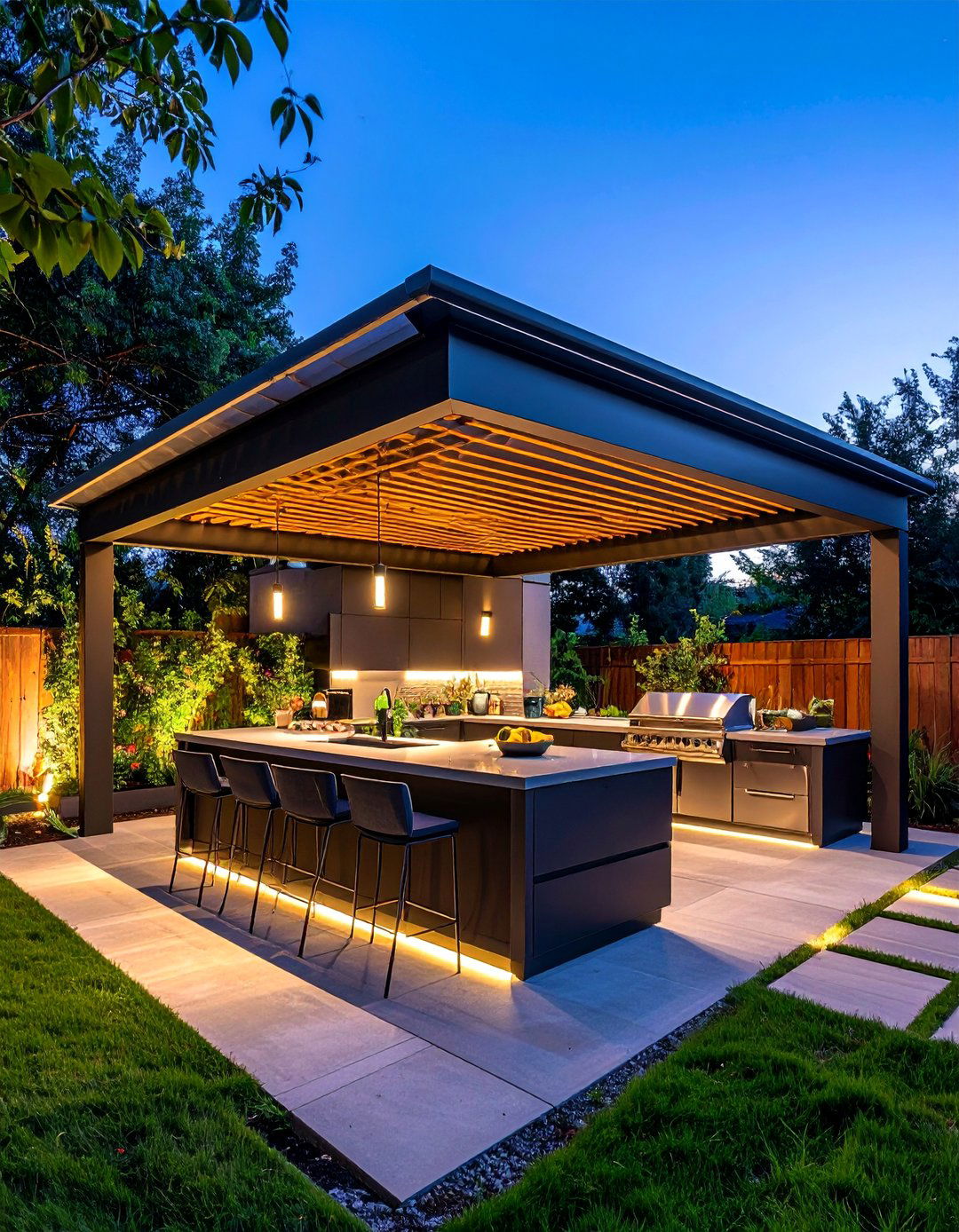
What if you could control exactly how much sun and shade your outdoor kitchen receives with just the push of a button? Louvered pergola systems feature adjustable aluminum slats that tilt open and closed, giving you complete control over light and airflow. These modern marvels often include rain sensors that automatically close the louvers when weather turns bad, keeping your cooking area dry. The sleek aluminum construction resists rust and fading while providing a contemporary aesthetic that complements modern homes. Many models integrate LED lighting systems and can support ceiling fans for added comfort during hot summer cooking sessions.
2. Classic Wooden Pergola Designs
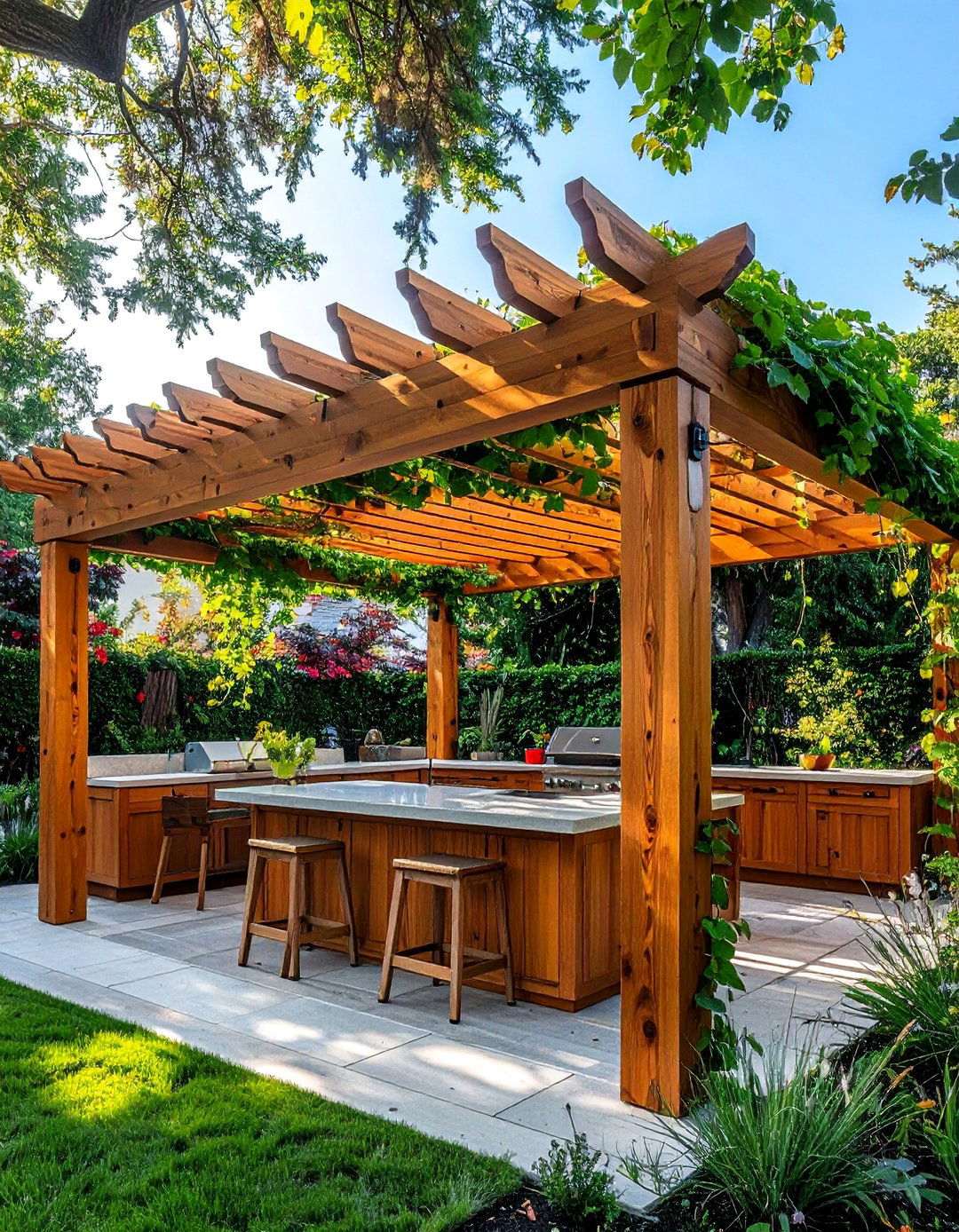
Nothing beats the timeless appeal of a traditional wooden pergola stretching over your outdoor kitchen space. Cedar and redwood naturally resist moisture and insects while developing a beautiful weathered patina over time. The open-lattice design creates dappled shade that keeps you comfortable while still allowing enough light for safe food preparation. You can train climbing vines like grapevines or jasmine over the structure to enhance privacy and create a living roof that changes with the seasons. These pergolas work beautifully when positioned to frame mountain views or garden landscapes beyond your cooking area.
3. Solid Metal Pavilion Roofs
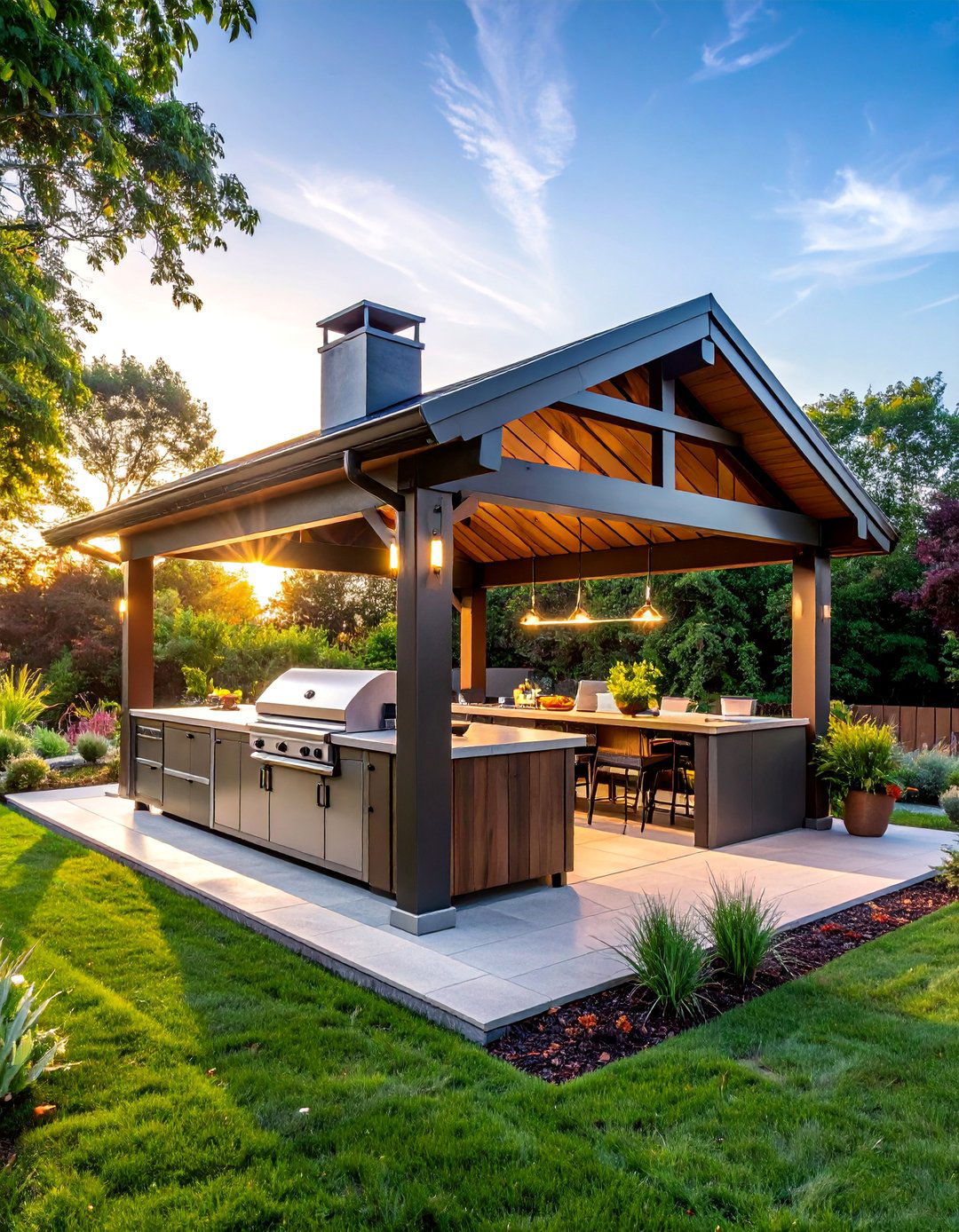
Does your outdoor kitchen need serious weather protection that can handle everything from blazing sun to heavy snowfall? Solid metal pavilion roofs constructed from steel or aluminum provide complete coverage with exceptional durability. The pitched design sheds rain and snow efficiently while the solid construction blocks harmful UV rays entirely. Modern powder coating prevents rust and fading while offering color options that coordinate with your home's exterior. These structures often include integrated guttering systems that direct water away from your cooking and dining areas, making them ideal for regions with frequent precipitation.
4. Retractable Awning Coverage
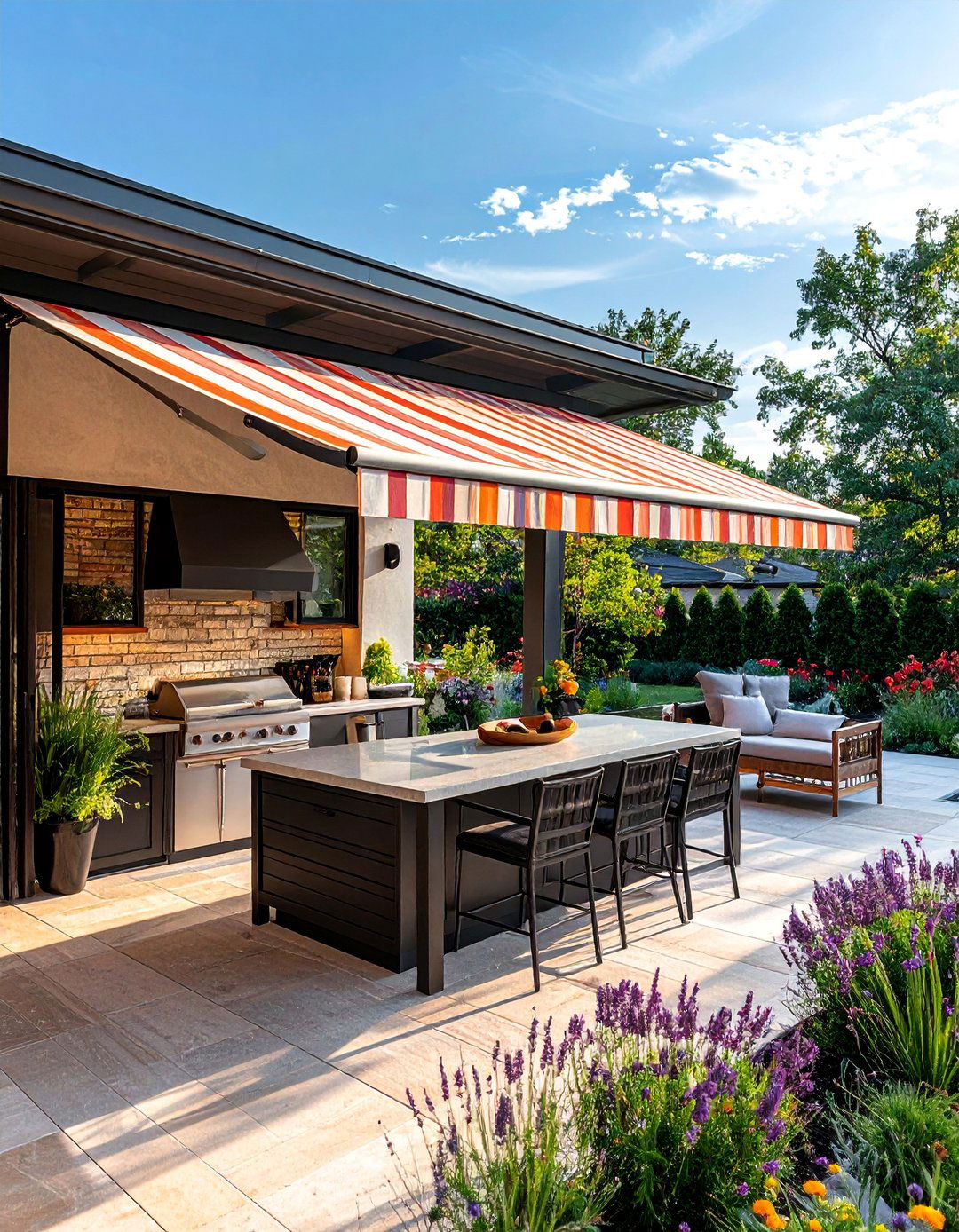
Retractable awnings offer the ultimate flexibility for outdoor kitchen coverage, extending when you need shade and retracting to let sunshine in during pleasant weather. Motorized versions operate with wireless remote controls, making adjustment effortless even while your hands are busy with food preparation. The fabric options range from basic canvas to high-performance acrylics that resist fading, mildew, and water damage. Sensors can automatically retract the awning during high winds to prevent damage. These systems mount directly to your house wall or can be freestanding, making them adaptable to various outdoor kitchen layouts and configurations.
5. Gable Roof Structures
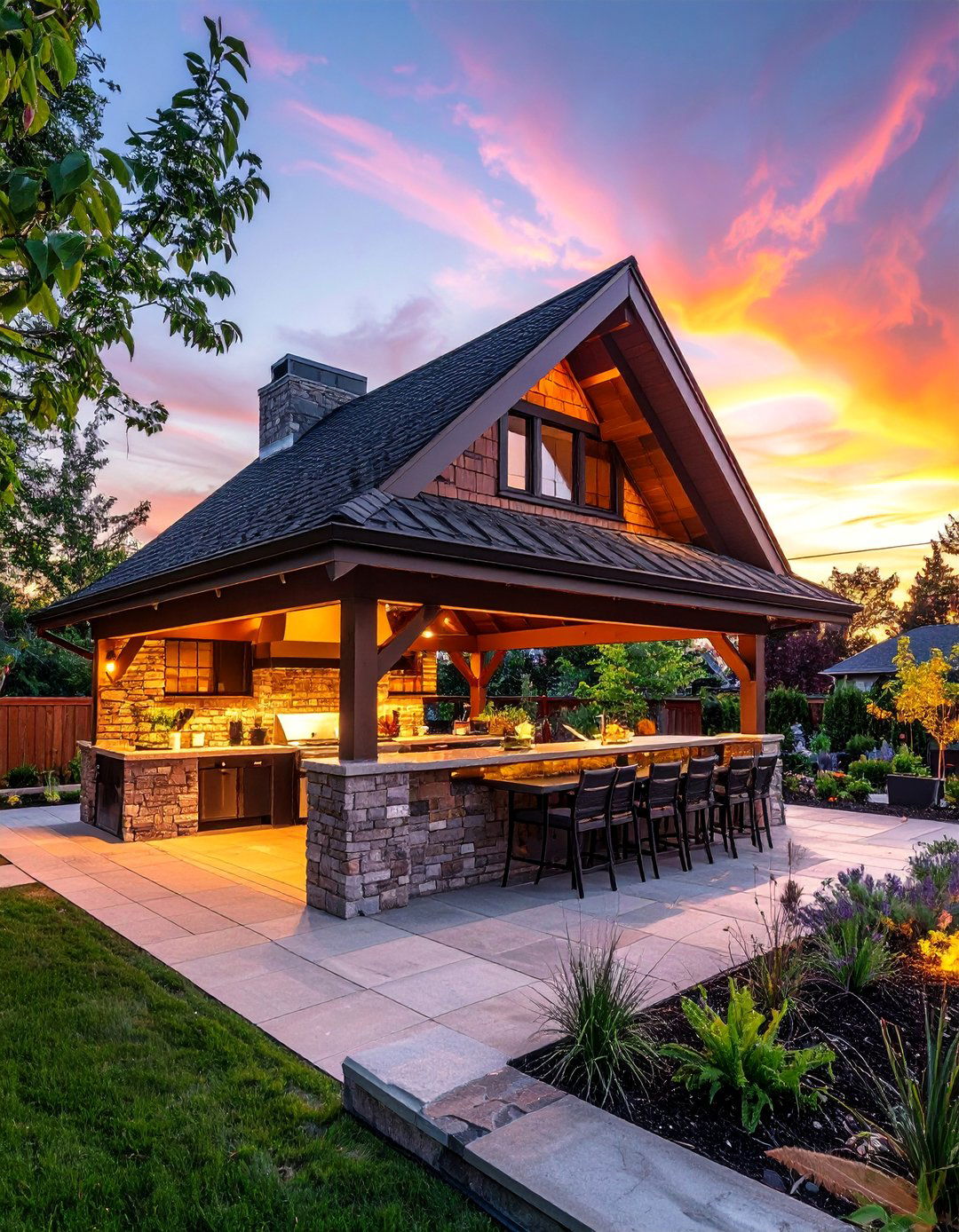
The classic gable roof design brings traditional charm and excellent weather protection to outdoor kitchens everywhere. This triangular roof style efficiently sheds rain and snow while providing ample headroom for tall cooks and ceiling fans. The steep pitch prevents water pooling and allows for dramatic interior volume that makes the space feel grand and open. You can match roofing materials to your main house for architectural continuity or choose contrasting materials to make your outdoor kitchen a distinctive focal point. The gable ends offer opportunities for decorative elements like windows, vents, or architectural details.
6. Modern Flat Roof Pavilions
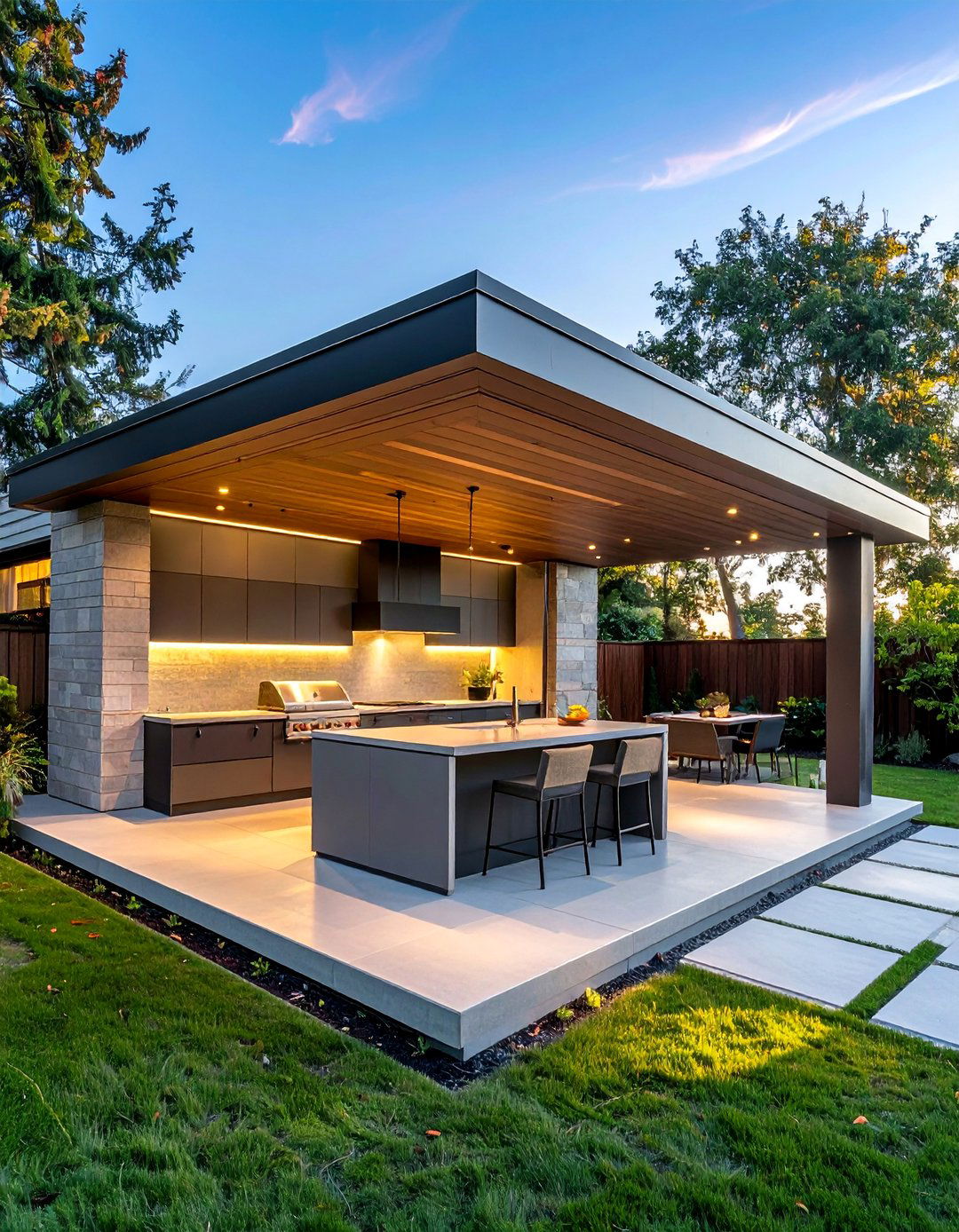
How do you create a sleek, contemporary look that complements modern home architecture? Flat roof pavilions deliver clean lines and minimalist aesthetics while providing complete overhead protection. Despite appearing flat, these roofs include subtle drainage slopes that prevent water accumulation. The simple design allows focus to remain on your kitchen equipment and outdoor furnishings rather than competing architectural elements. These structures work particularly well when integrated with outdoor lighting systems, since the flat surface provides an ideal mounting point for recessed fixtures, track lighting, or pendant lights that illuminate your cooking and prep areas effectively.
7. Hip Roof Outdoor Kitchens
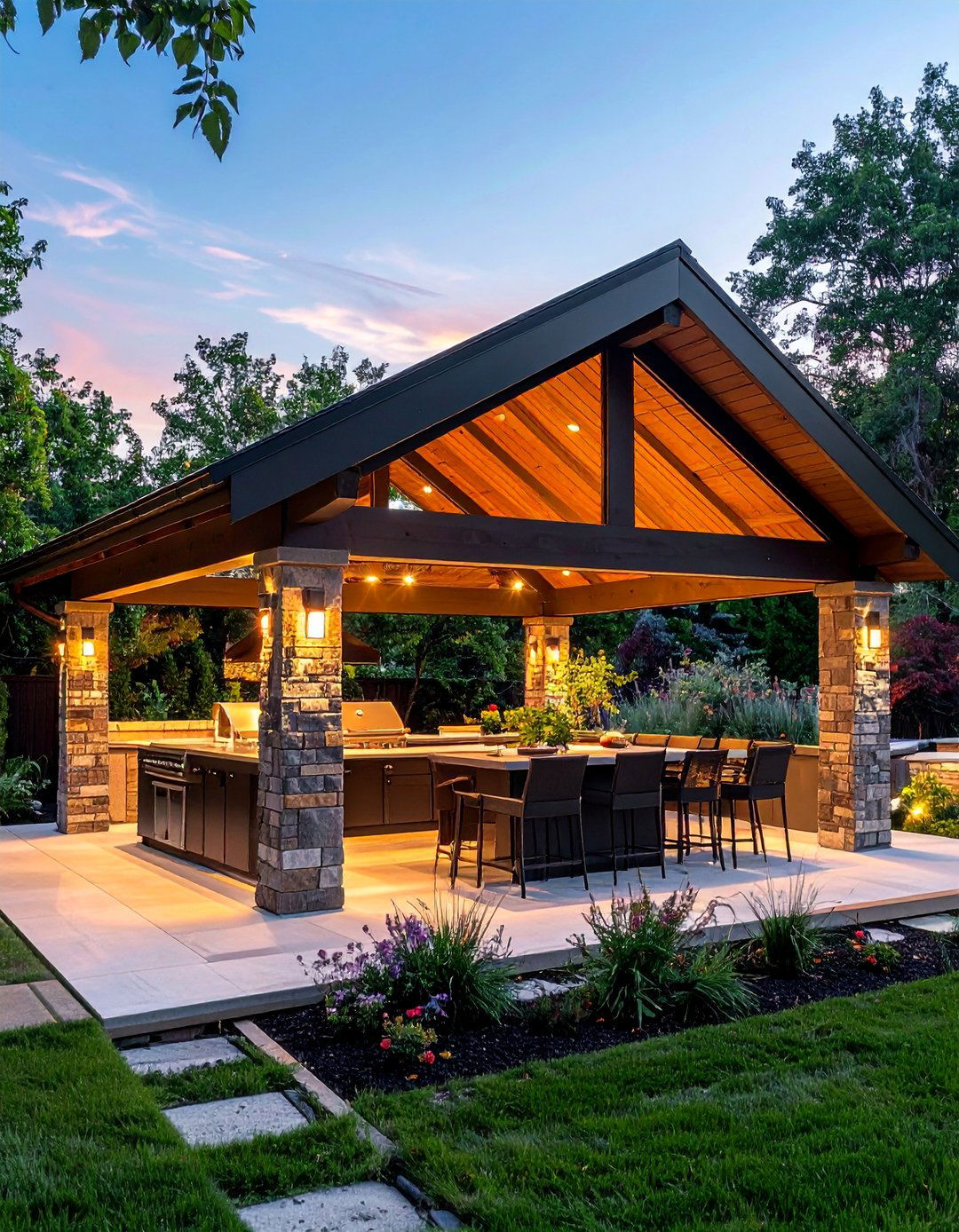
Hip roofs feature four sloping sides that meet at the top, creating balanced proportions and superior wind resistance for outdoor kitchen coverage. This design distributes weight evenly across all support posts, making it ideal for larger outdoor kitchen installations or areas prone to high winds. The symmetrical appearance works well with both traditional and contemporary home styles, while the sloping sides efficiently shed precipitation from all directions. The design often allows for clerestory windows or roof vents that provide natural light and ventilation without sacrificing weather protection for your cooking activities.
8. Shade Sail Systems
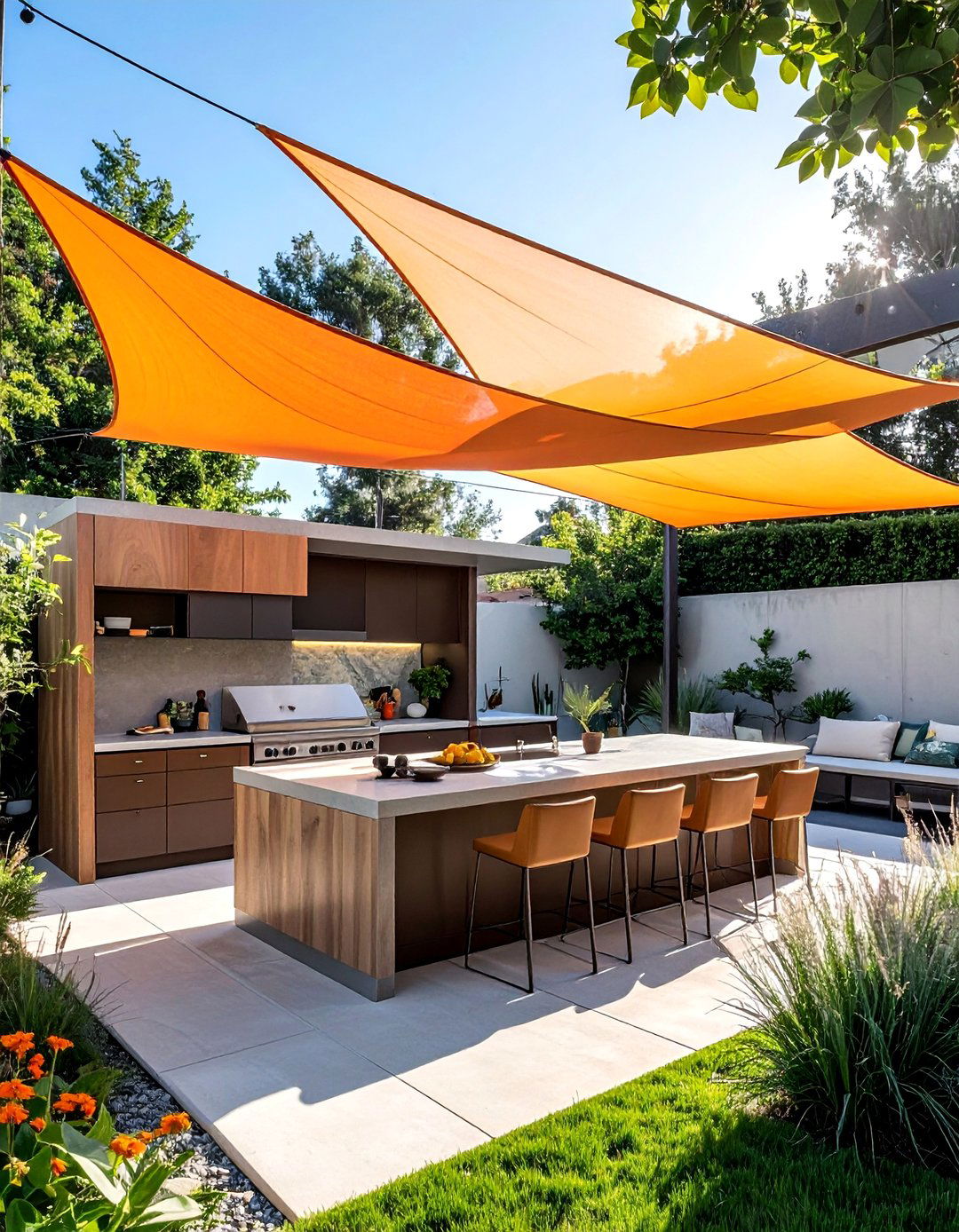
Shade sails bring artistic flair to outdoor kitchen coverage with their sculptural, flowing forms that seem to float above your cooking space. These tensioned fabric structures can be configured in multiple geometric patterns to create unique overhead canopies that change the visual dynamics of your backyard. The fabric breathes naturally, allowing air circulation while blocking up to 95% of harmful UV rays. Installation requires strategic anchor points, but the resulting coverage can span large areas without intermediate posts that might interfere with your kitchen layout. Many homeowners use multiple sails at different heights to create layered coverage and visual interest.
9. Gazebo Kitchen Enclosures
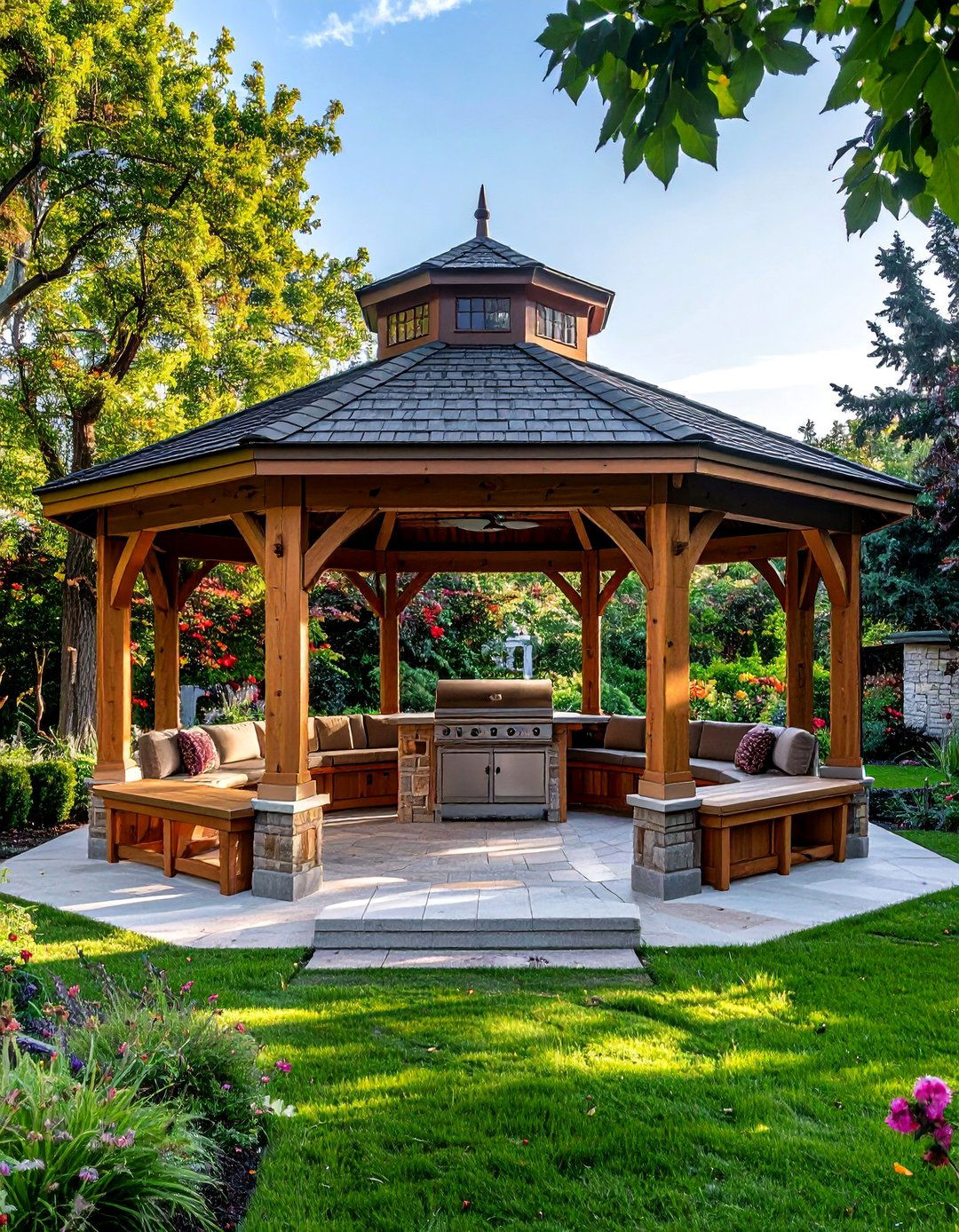
Traditional gazebos transform outdoor kitchens into charming garden rooms that feel both intimate and spacious. The octagonal or round design creates natural gathering spaces around your cooking area while the solid roof provides complete weather protection. Built-in bench seating along the gazebo perimeter offers convenient dining and socializing space without requiring additional furniture. The elevated roof design often accommodates ceiling fans or decorative lighting fixtures that enhance both comfort and ambiance. These structures work particularly well for outdoor kitchens that emphasize entertaining and social cooking rather than quick meal preparation.
10. Corrugated Metal Roofing
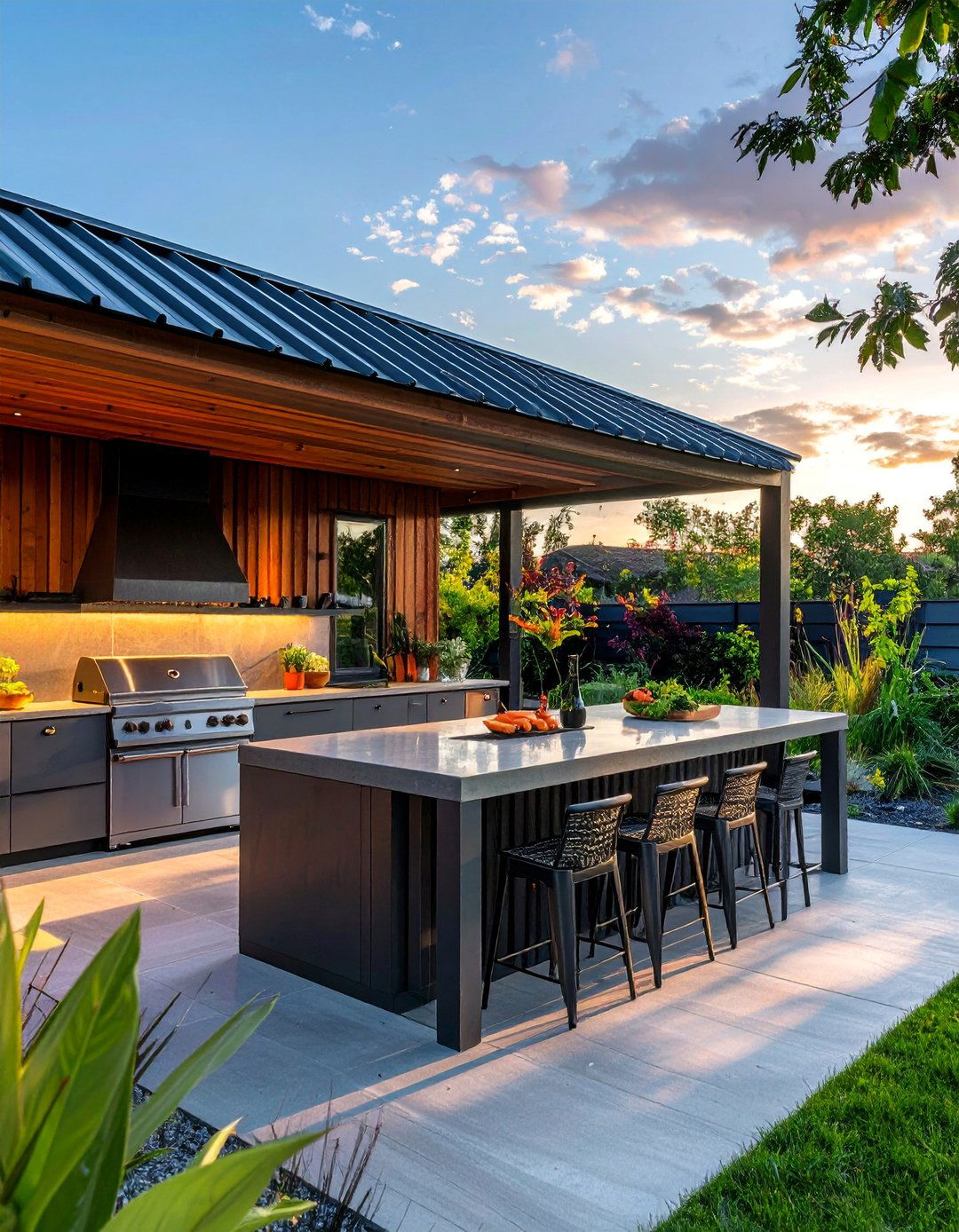
Industrial-style corrugated metal roofing brings rugged durability and modern aesthetic appeal to outdoor kitchen spaces. The ribbed design effectively sheds water while the metal construction resists fire, pests, and weather damage better than most alternatives. Sound dampening materials can be added underneath to reduce noise during rain storms. The material works particularly well in contemporary or industrial-themed outdoor designs, and the long panels can span significant distances with minimal support structure required. Color options have expanded beyond basic galvanized silver to include earth tones, blues, and greens that coordinate with landscape elements.
11. Glass Panel Roofing
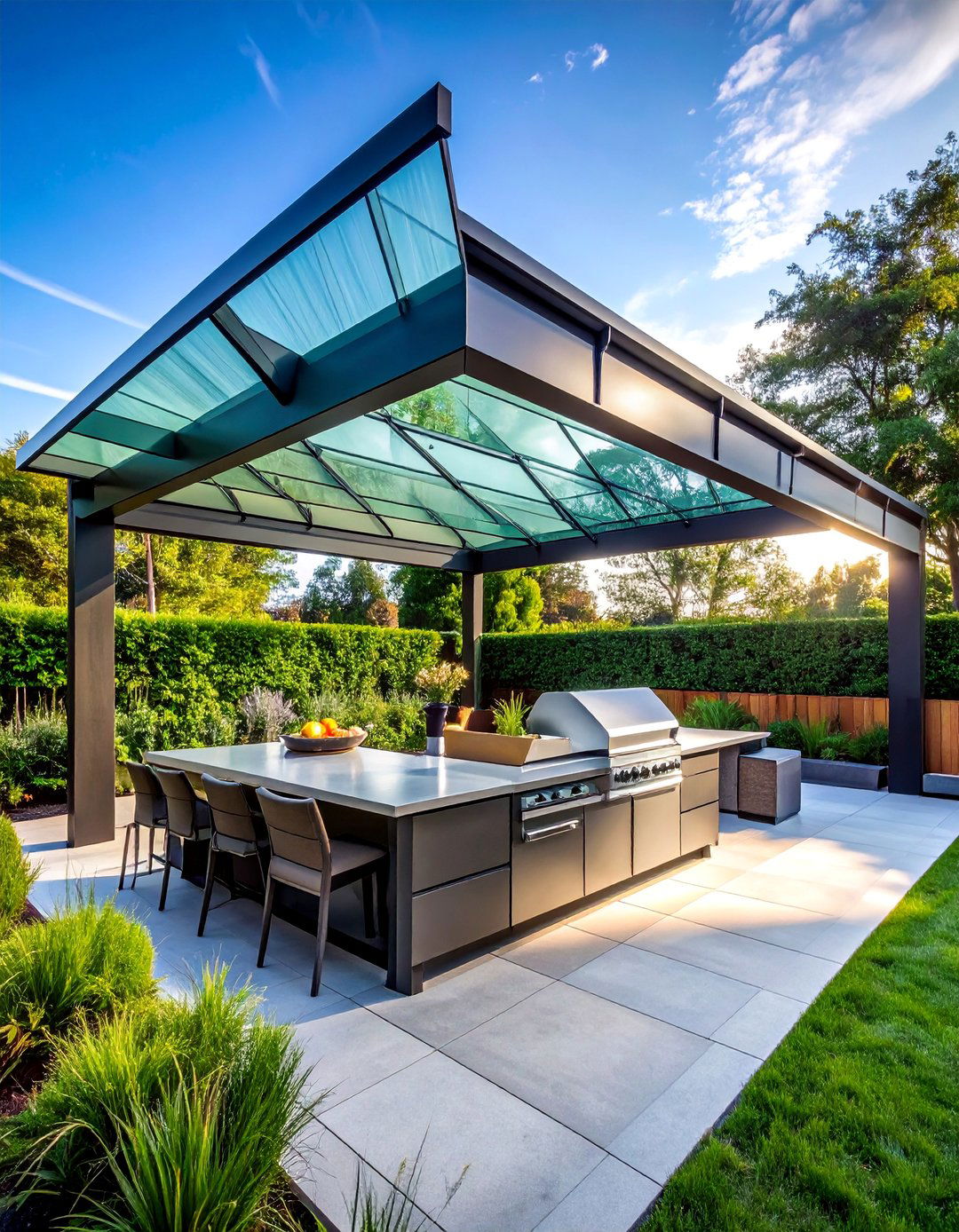
Transparent glass panel roofing creates the ultimate connection between indoor comfort and outdoor cooking while maintaining protection from precipitation and wind. Tempered glass panels resist impact damage while allowing natural light to flood your cooking workspace throughout the day. The transparency preserves views of sky and surrounding landscape while creating a greenhouse effect that can extend your outdoor cooking season. Automated opening panels or vents prevent overheating during hot weather. These systems work beautifully for outdoor kitchens adjacent to indoor spaces, creating seamless transitions between interior and exterior cooking areas.
12. Timber Frame Pavilion Construction
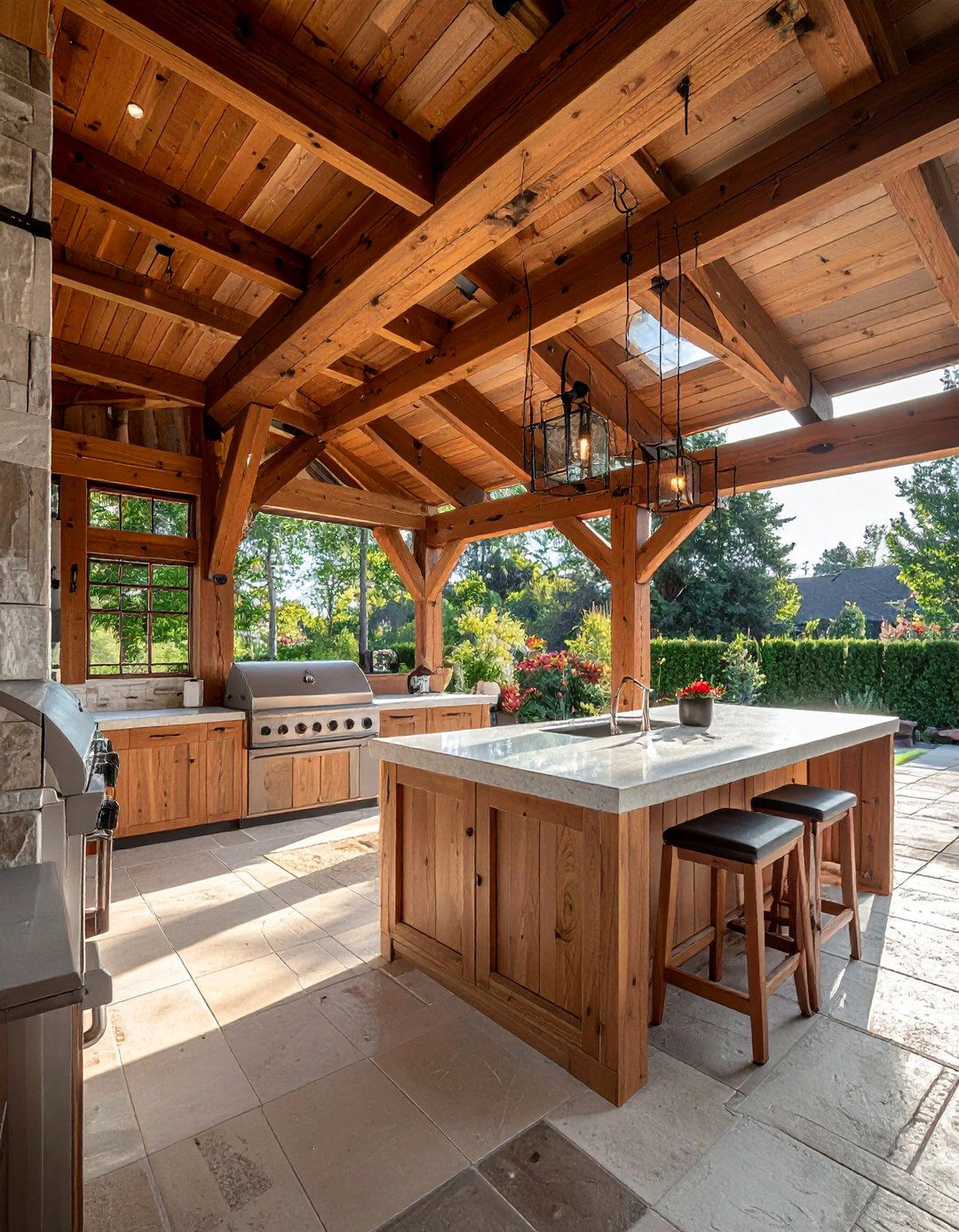
Massive timber frame construction creates outdoor kitchen pavilions that feel like permanent outdoor rooms with centuries of proven durability. Heavy wooden beams support substantial roof loads while creating dramatic interior spaces that showcase traditional joinery techniques. The robust construction easily accommodates ceiling fans, lighting systems, and even second-story additions if desired. Natural wood aging creates beautiful patina that enhances rather than detracts from appearance over time. These structures often become multigenerational gathering spaces that anchor family properties and provide settings for countless outdoor meals and celebrations throughout the years.
13. Canopy and Tent Structures
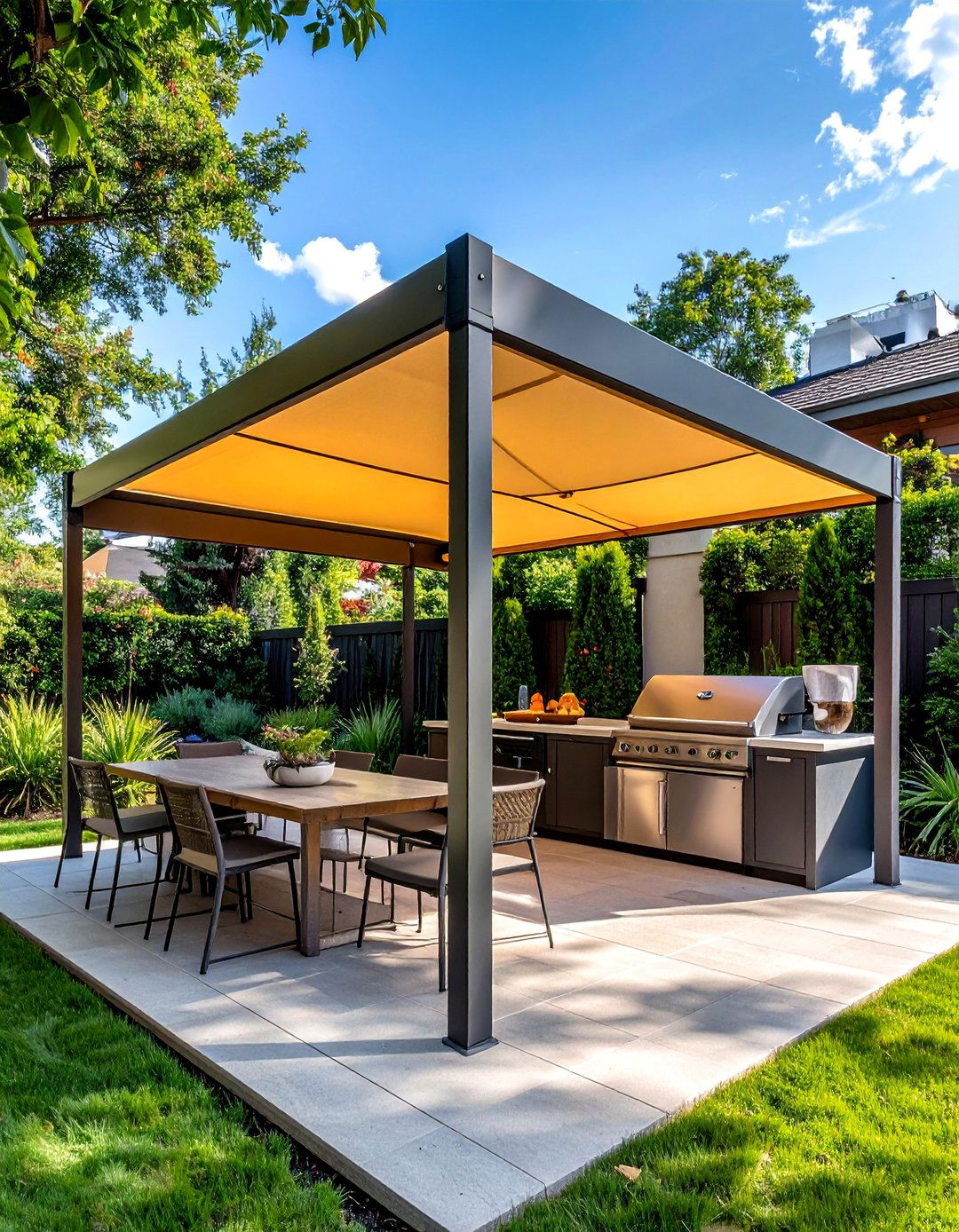
Flexible canopy systems offer budget-friendly outdoor kitchen coverage that can be adjusted, moved, or removed as needed throughout the seasons. Modern canopies feature reinforced frames and weather-resistant fabrics that provide reliable protection during use while storing compactly when not needed. Many designs include sidewalls that can be added for wind protection or removed for open-air cooking. The portability makes them ideal for renters or homeowners who want to experiment with outdoor kitchen placement before committing to permanent structures. Quick setup and breakdown allow for seasonal storage or relocation based on changing sun patterns.
14. Lean-To Roof Extensions
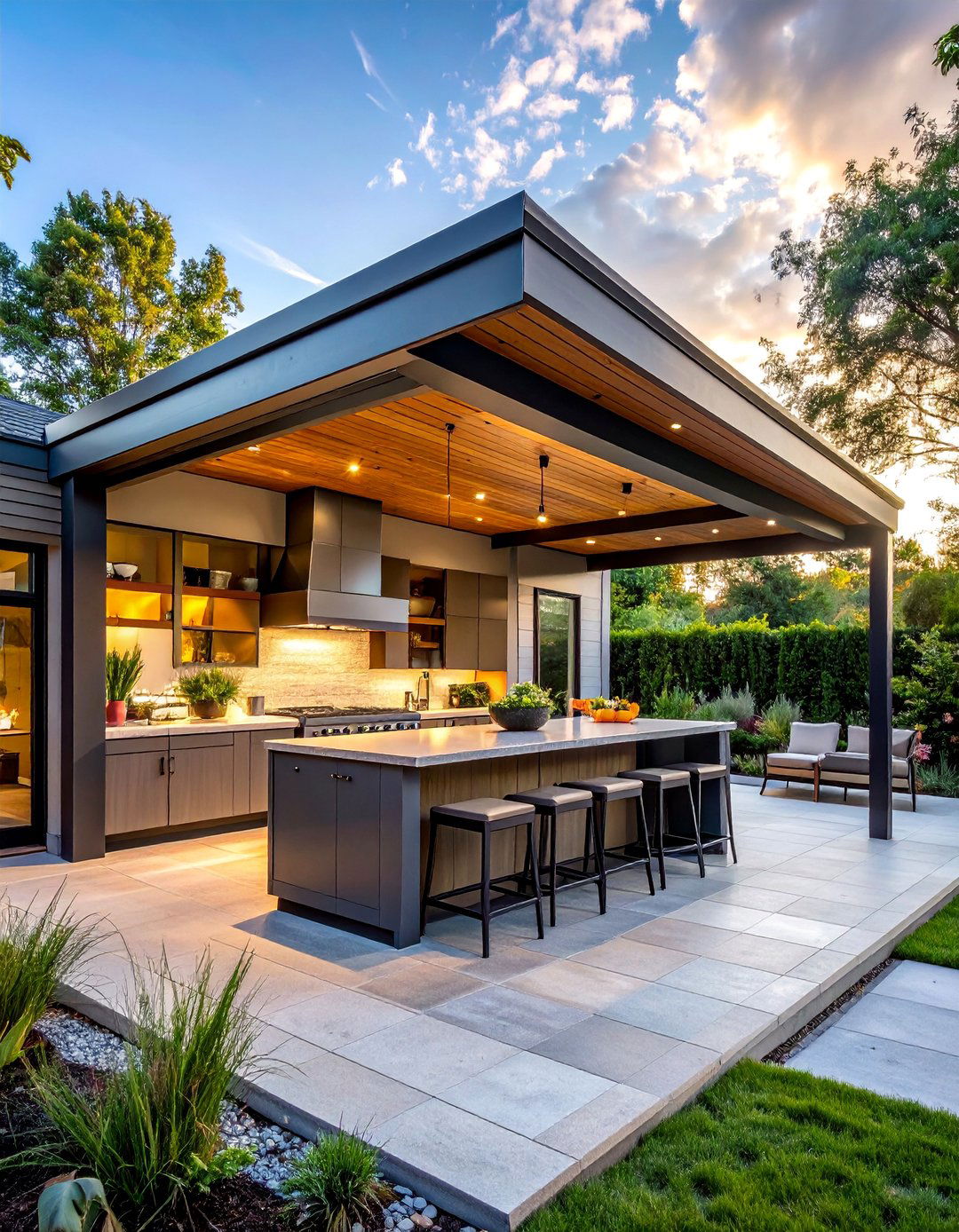
Lean-to roofs extend existing house rooflines to cover outdoor kitchen areas, creating natural architectural flow between indoor and outdoor spaces. This approach often proves more cost-effective than freestanding structures while providing the same weather protection and usability. The single-slope design directs water runoff away from both the outdoor kitchen and the house foundation. Existing house electrical and plumbing systems can often be extended easily under the shared roofline. The covered area feels like a true extension of interior living space, making it ideal for outdoor kitchens that function as secondary meal preparation areas.
15. Pergola Roof Covering Systems
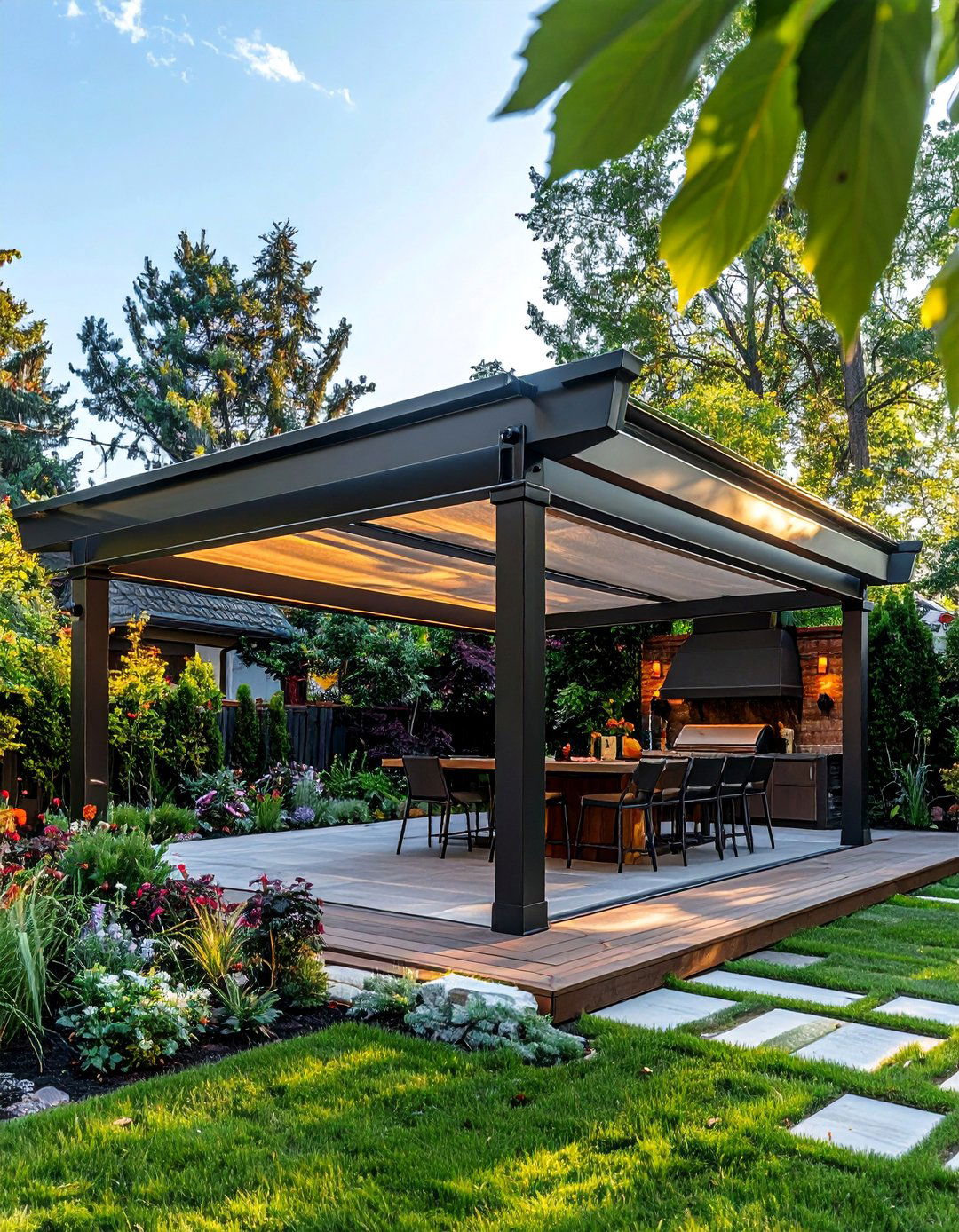
Pergola roof covering systems combine the classic appeal of traditional pergolas with practical weather protection through retractable or removable cover panels. Waterproof fabric panels, clear polycarbonate sheets, or retractable screens can be added seasonally or as needed for specific weather conditions. The base pergola provides year-round structural beauty while the covering systems add functionality when required. This approach offers maximum flexibility for different seasons and weather patterns while maintaining the light, airy feel that makes pergolas popular. The systems often include tracks or guides that make cover installation and removal simple for any family member.
16. Barrel Vault Roof Designs
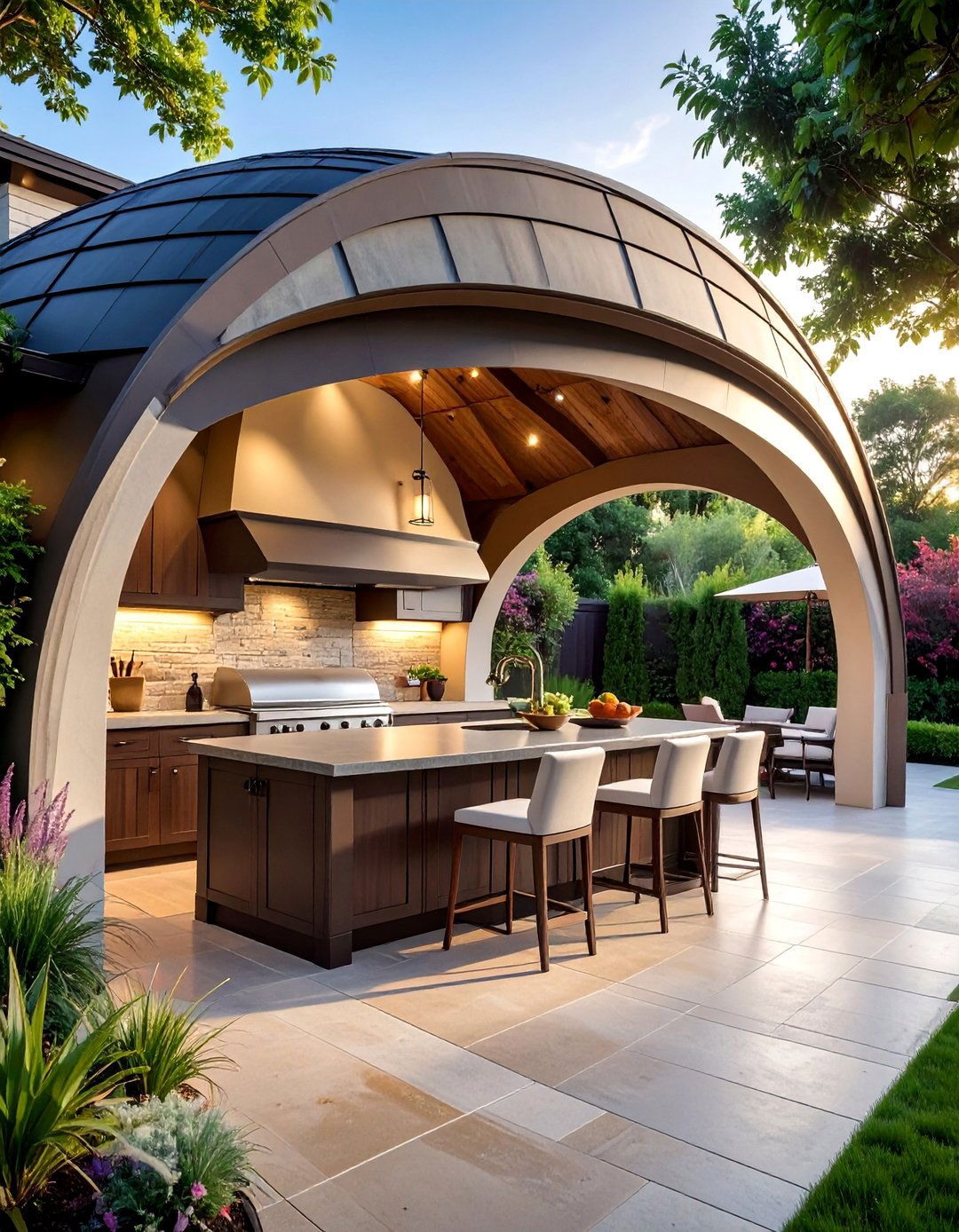
Curved barrel vault roofs bring architectural sophistication and excellent weather protection to outdoor kitchen spaces through their graceful arched construction. The continuous curve efficiently sheds rain and snow while creating soaring interior volume that feels grand and spacious. The design works particularly well for long, linear outdoor kitchen layouts where the curve can be appreciated from multiple angles. Modern materials like bent steel or laminated wood beams make these dramatic roofs achievable for residential projects. The curved interior ceiling provides excellent acoustics for conversation and often accommodates lighting systems that create beautiful shadow patterns.
17. Shed Style Roof Coverage
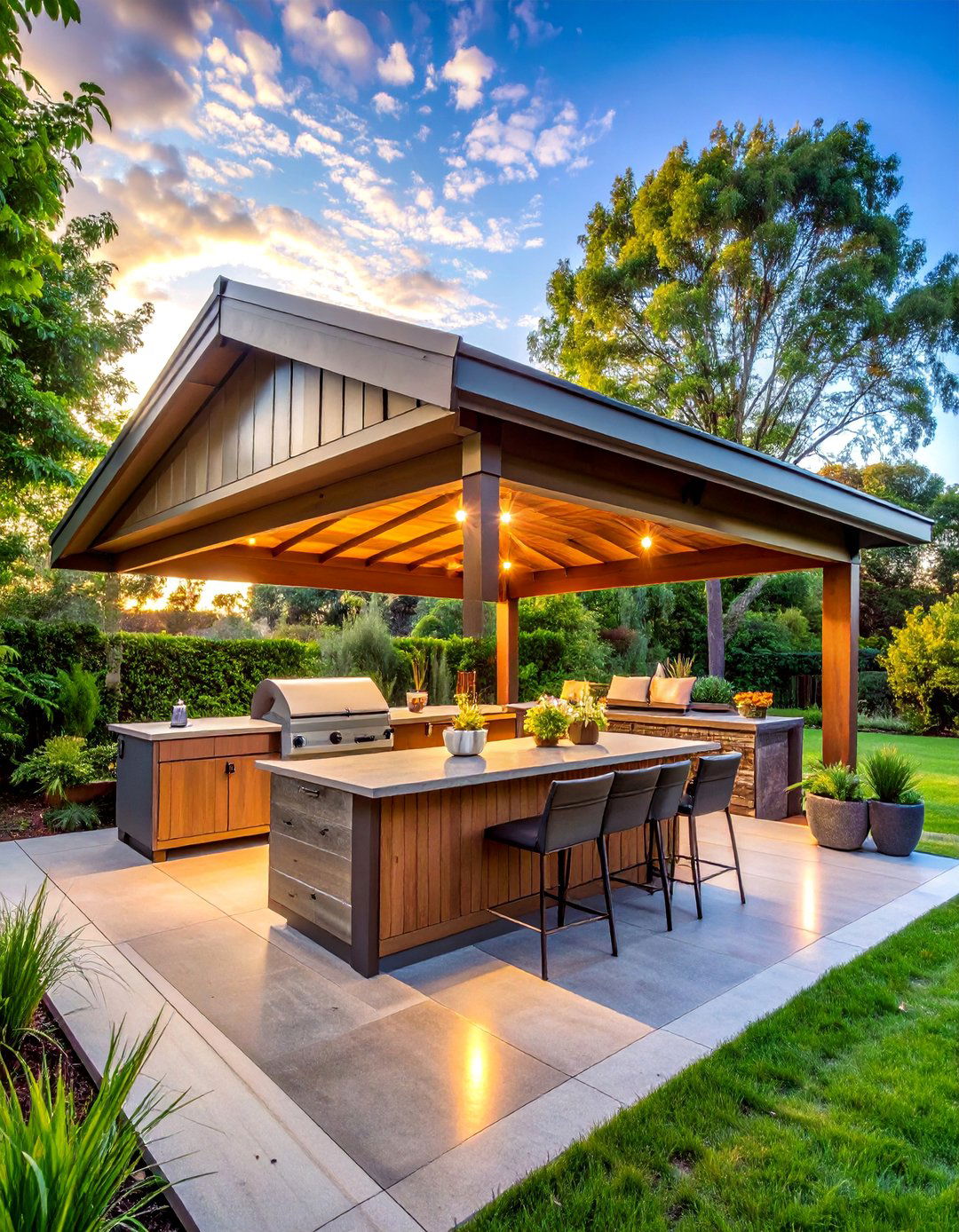
Simple shed-style roofs slope in one direction, making them perfect for outdoor kitchens where clearance or height restrictions limit other roofing options. The single-slope design directs all water runoff to one side, making drainage planning straightforward and effective. This economical roofing approach works well for outdoor kitchens positioned against property lines, existing structures, or under large trees where other roof styles might not fit. The sloping interior ceiling can accommodate ceiling fans, lighting, or storage systems while maintaining adequate headroom throughout the cooking area. The clean lines complement both traditional and contemporary home styles effectively.
18. Multi-Level Roofing Systems
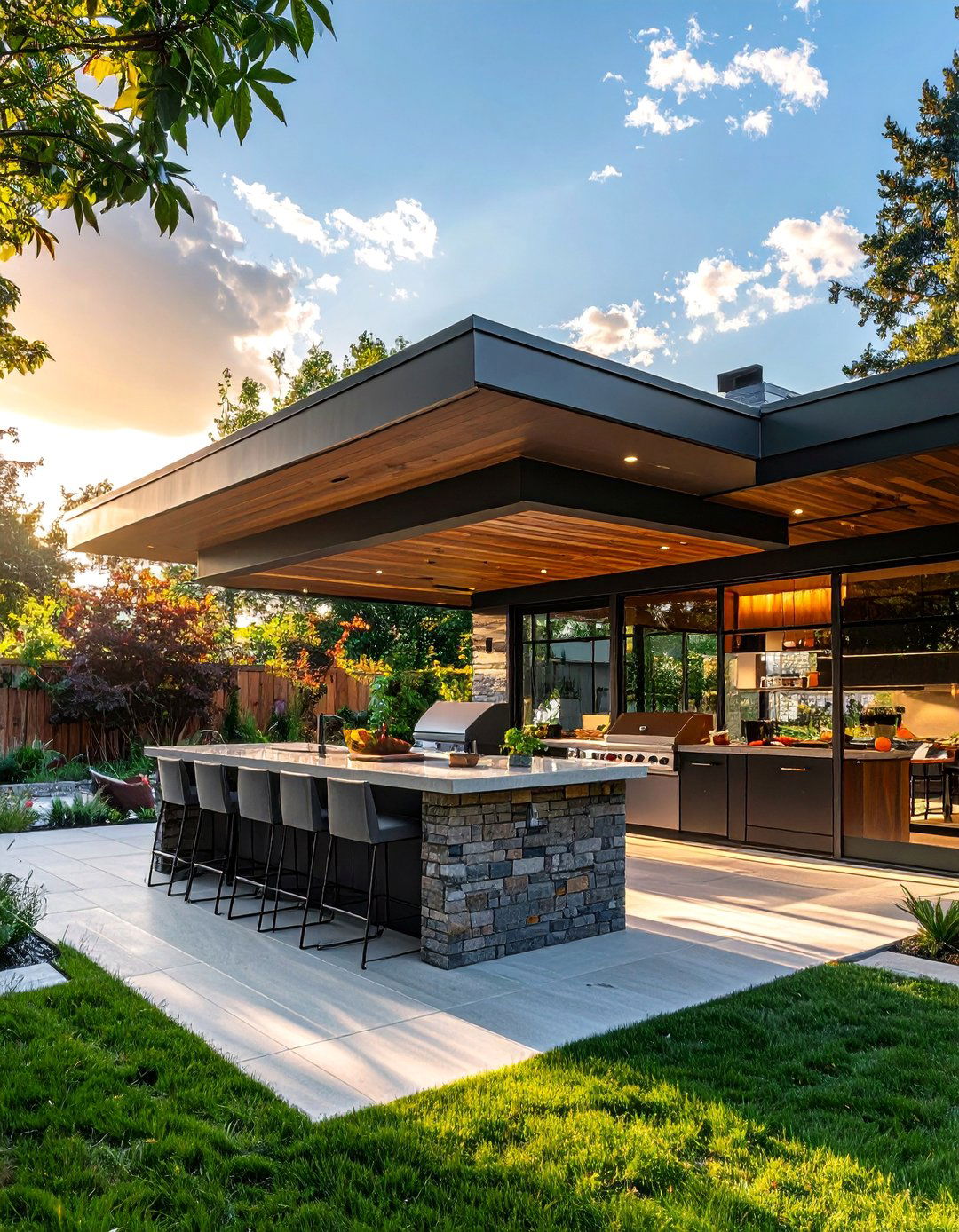
Complex multi-level roofing systems create dynamic outdoor kitchen spaces with zones for different activities and varying levels of weather protection. Higher roof sections can cover cooking areas that require ventilation while lower sections provide intimate dining or seating areas. The varying heights create visual interest and help define functional areas within larger outdoor kitchen installations. Different materials can be used at each level to create contrast and highlight specific areas. Clerestory windows between roof levels provide natural light and ventilation while maintaining weather protection throughout the covered space.
19. Living Roof Integration
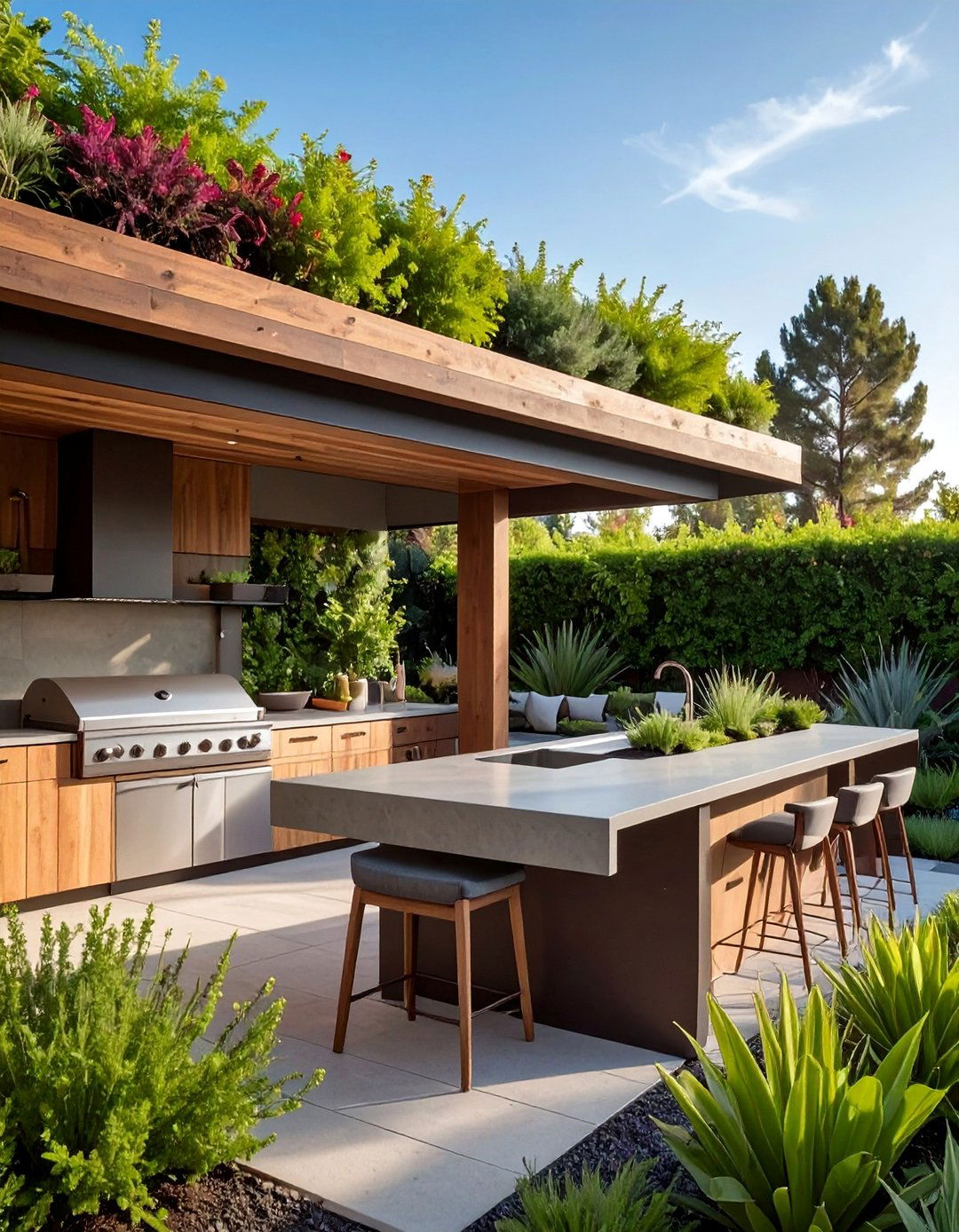
Living roofs covered with drought-tolerant plants create environmentally sustainable outdoor kitchen coverage that changes beautifully with the seasons. The plant coverage provides natural insulation, reduces storm water runoff, and creates habitat for beneficial insects and birds. Structural requirements are substantial due to soil weight, but the resulting coverage provides excellent temperature regulation and unique aesthetic appeal. Maintenance involves seasonal plant care rather than traditional roof repairs. These systems work particularly well for outdoor kitchens in sustainable or eco-friendly landscape designs where environmental impact reduction is a priority consideration.
20. Combination Structure Designs
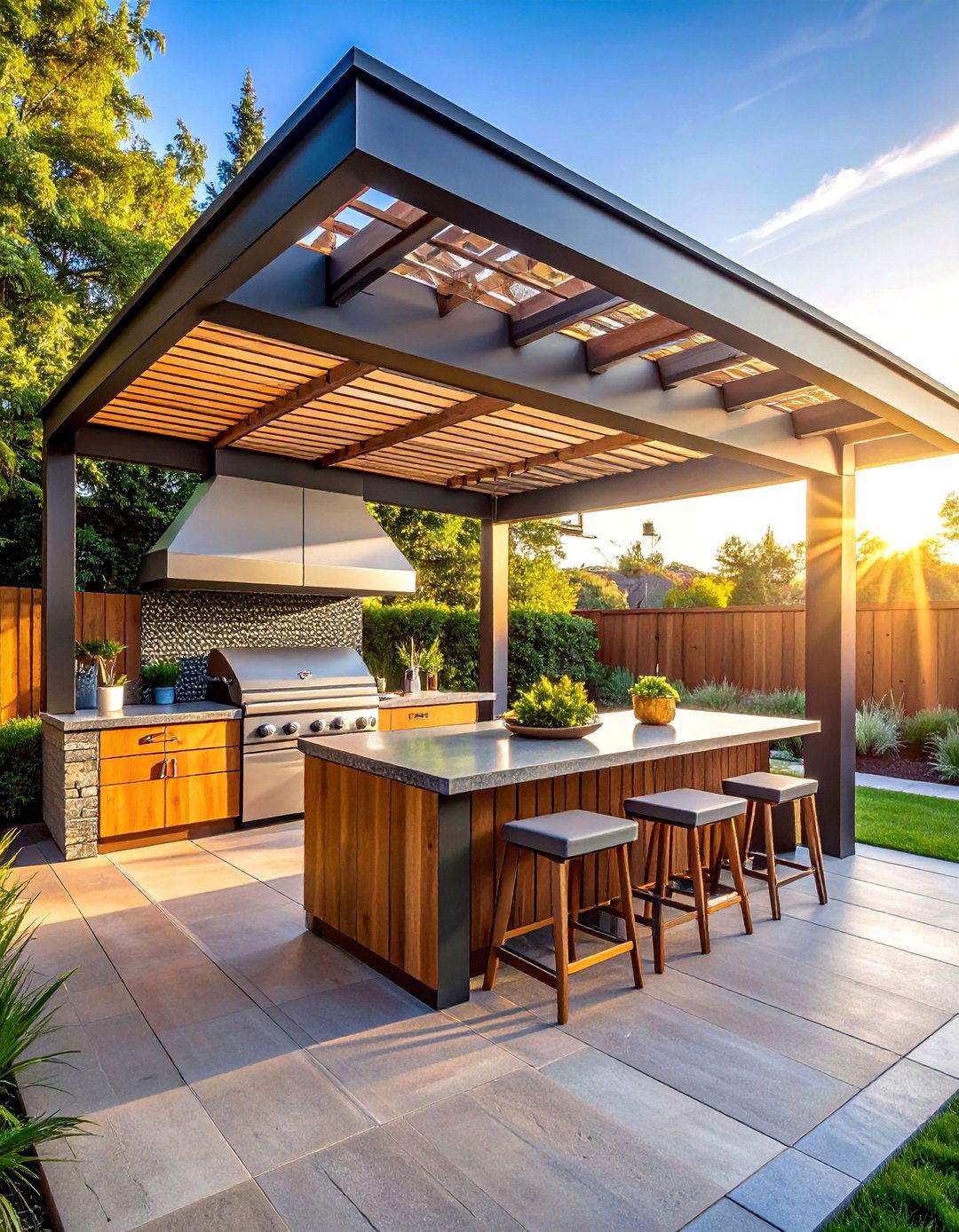
Why choose just one roofing approach when you can combine multiple systems for maximum functionality and visual appeal? Combination designs might include solid roofing over cooking areas with pergola coverage extending over dining spaces, or retractable awnings that supplement permanent roof structures during extreme weather. Mixed materials like wood and metal, or different roof heights and styles create outdoor kitchen coverage that addresses multiple needs while maintaining design cohesion. These complex systems often evolve over time as outdoor kitchen use patterns become clear and family needs change throughout different life stages.
Conclusion:
The perfect outdoor kitchen roof transforms your backyard into a true outdoor living room where cooking, dining, and entertaining happen comfortably throughout the year. Whether you choose the high-tech convenience of motorized louvered systems, the timeless charm of wooden pergolas, or the solid protection of pavilion roofs, your choice should reflect both your climate needs and personal style preferences. Consider factors like local weather patterns, existing home architecture, and how you actually use your outdoor space when making this important decision. The right roof structure becomes the foundation for countless family gatherings, impromptu dinner parties, and peaceful solo cooking sessions under the open sky. With proper planning and quality materials, your outdoor kitchen roof will provide decades of protection while creating that perfect blend of indoor comfort and outdoor freedom that makes backyard cooking so appealing.

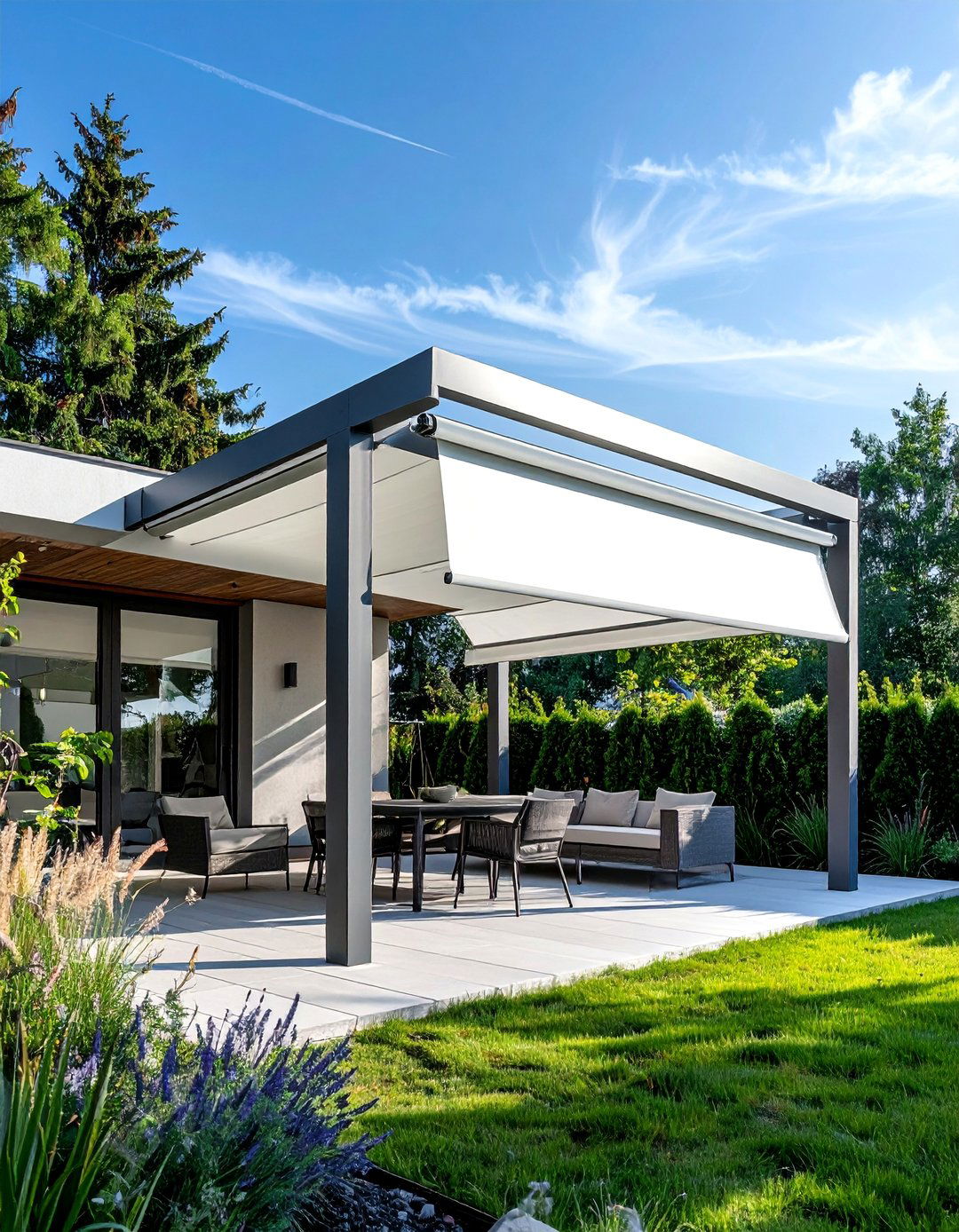
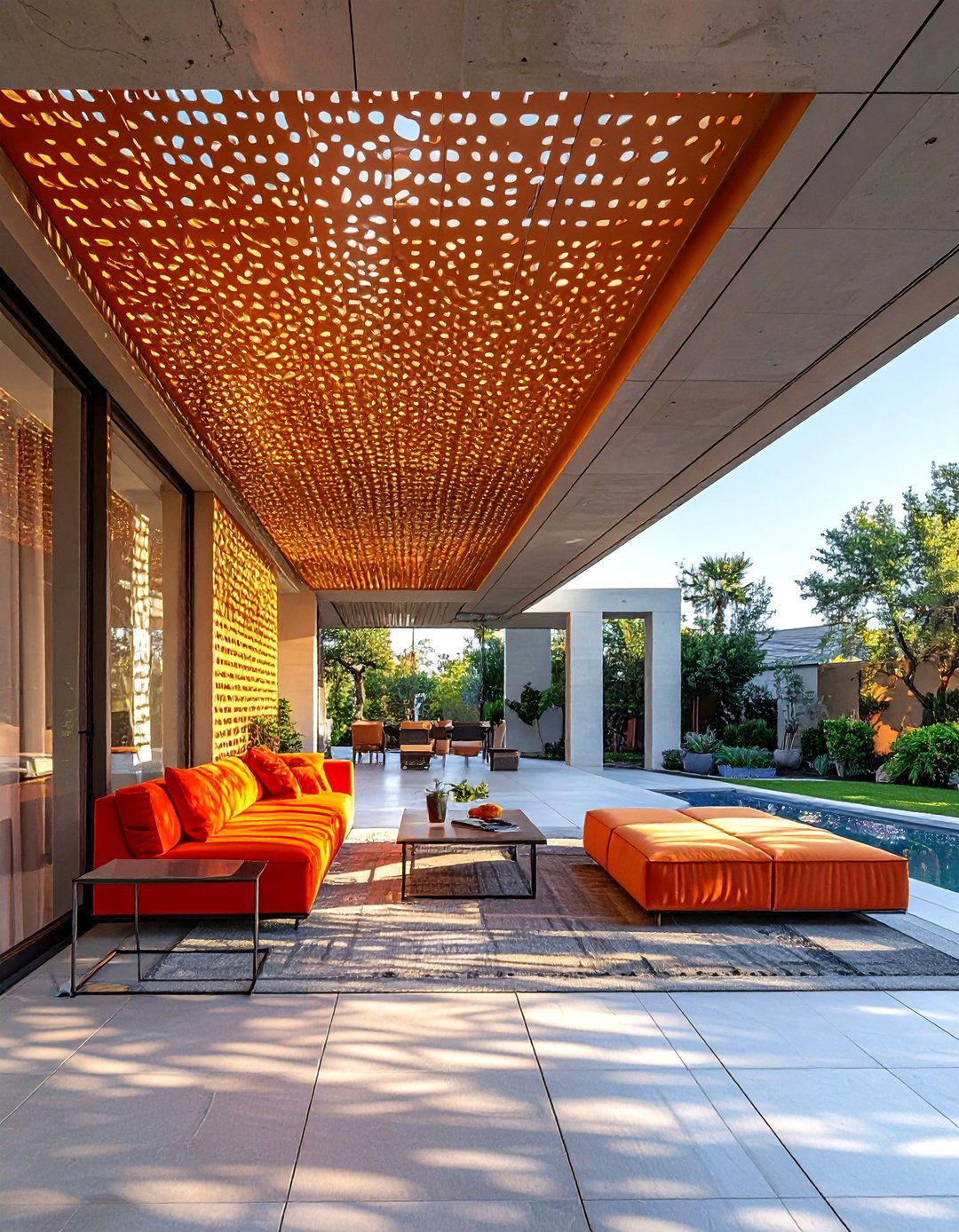
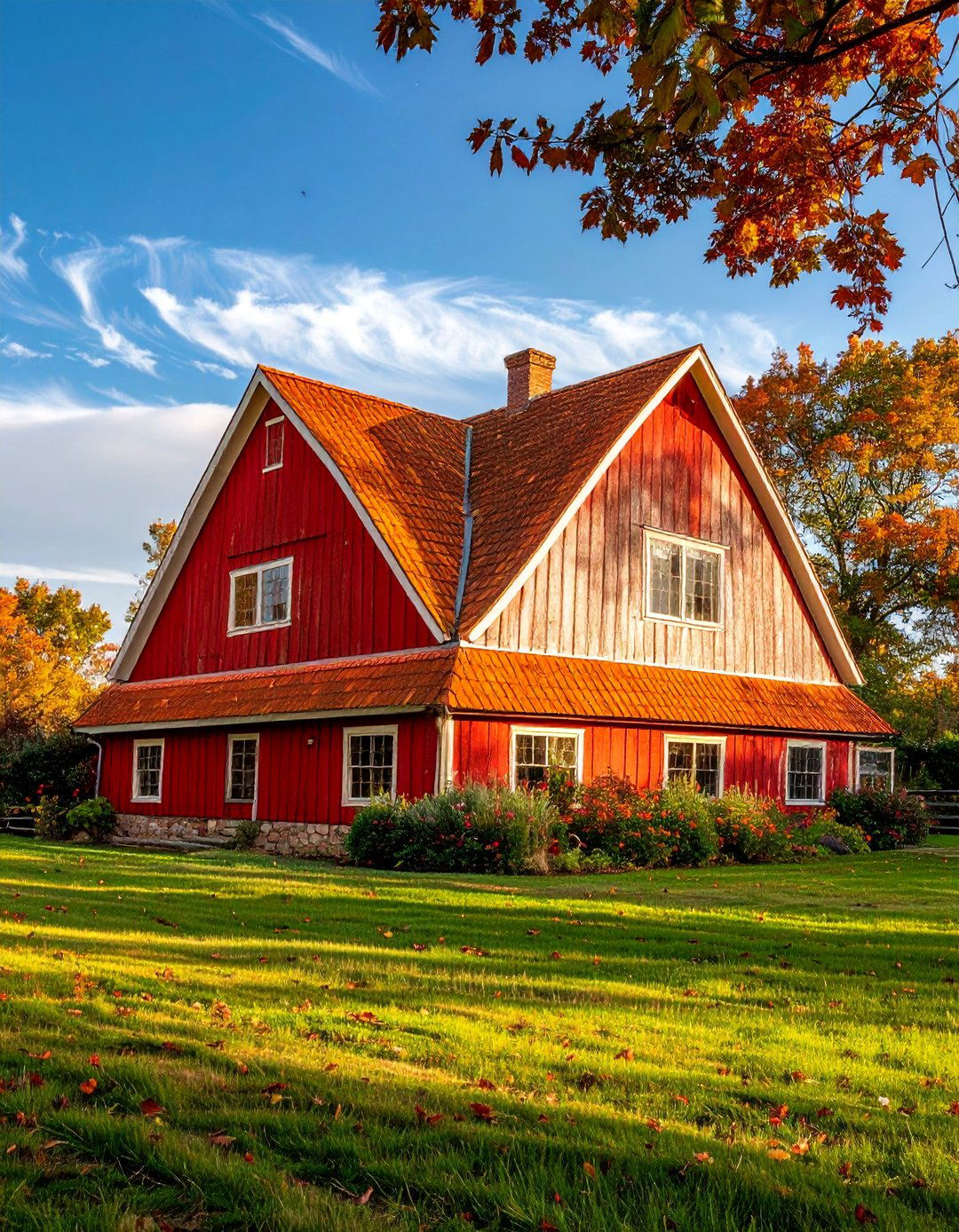
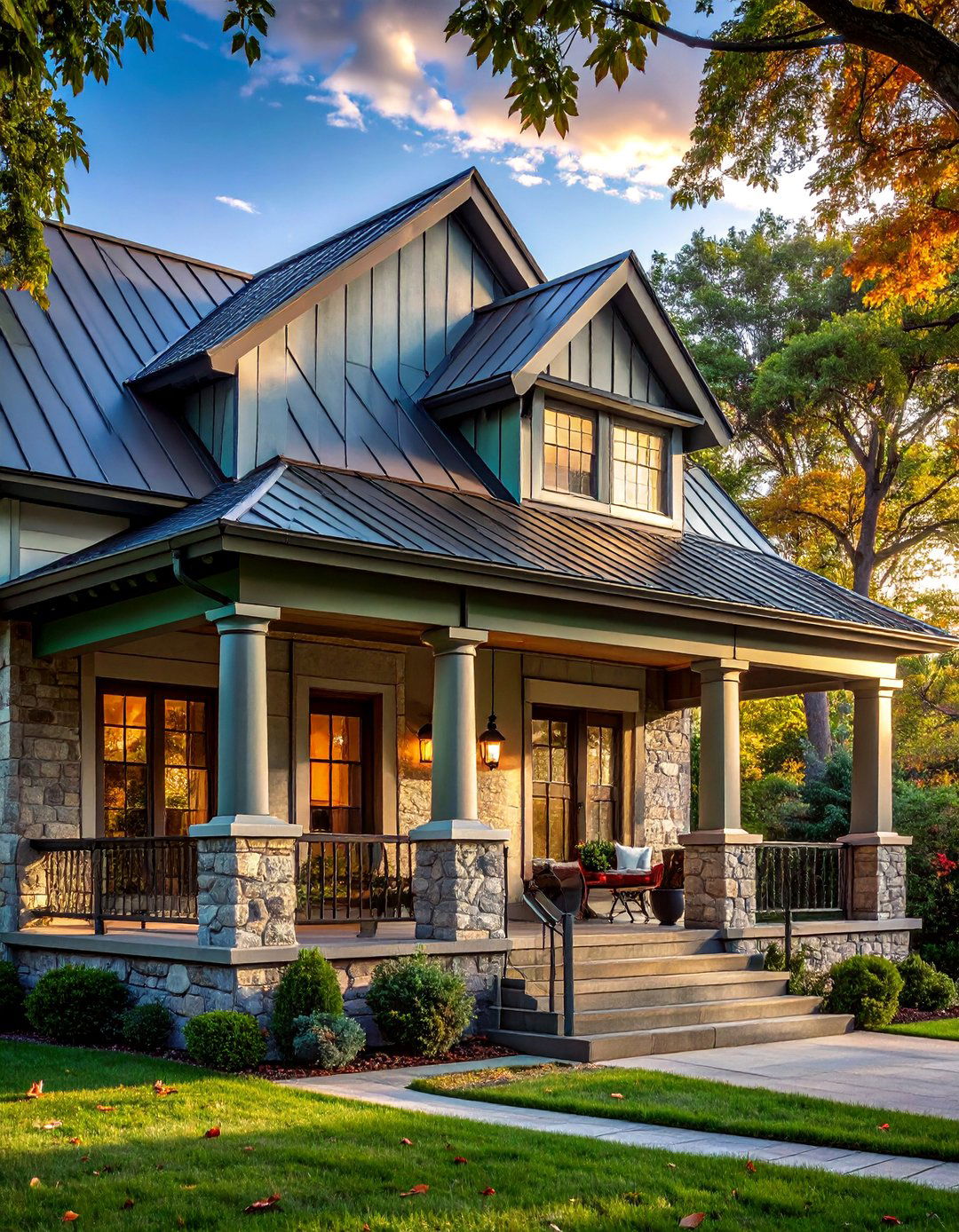
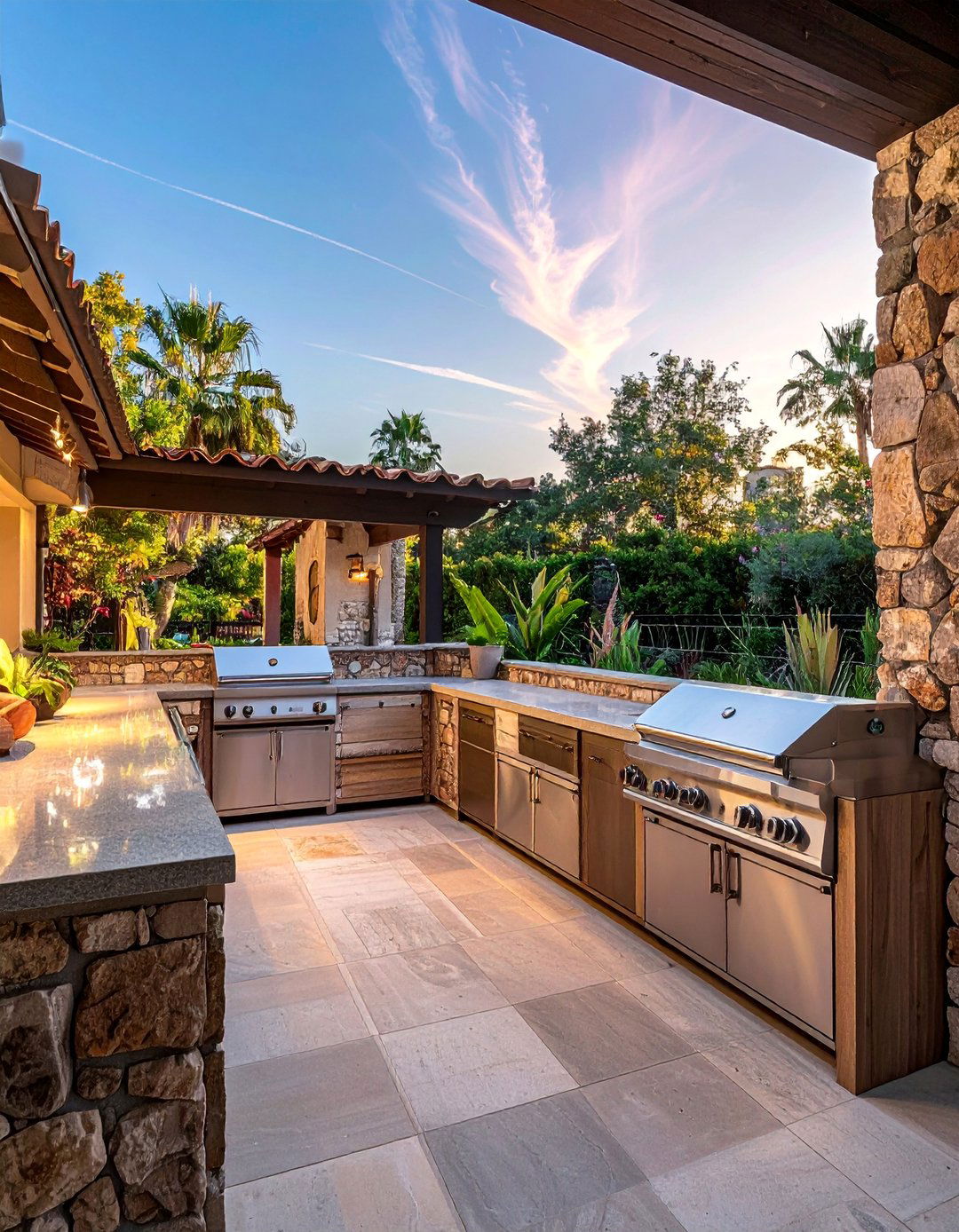
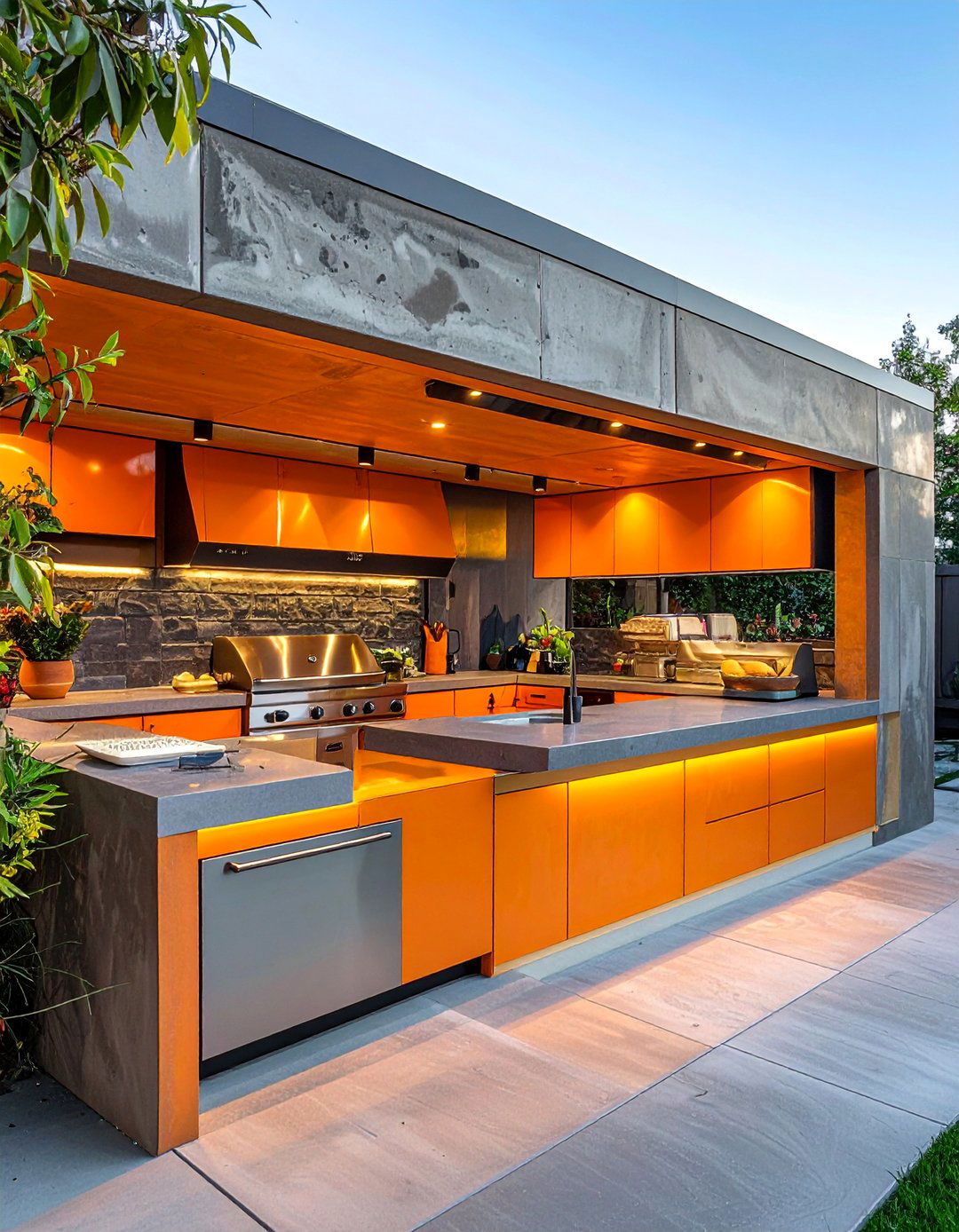
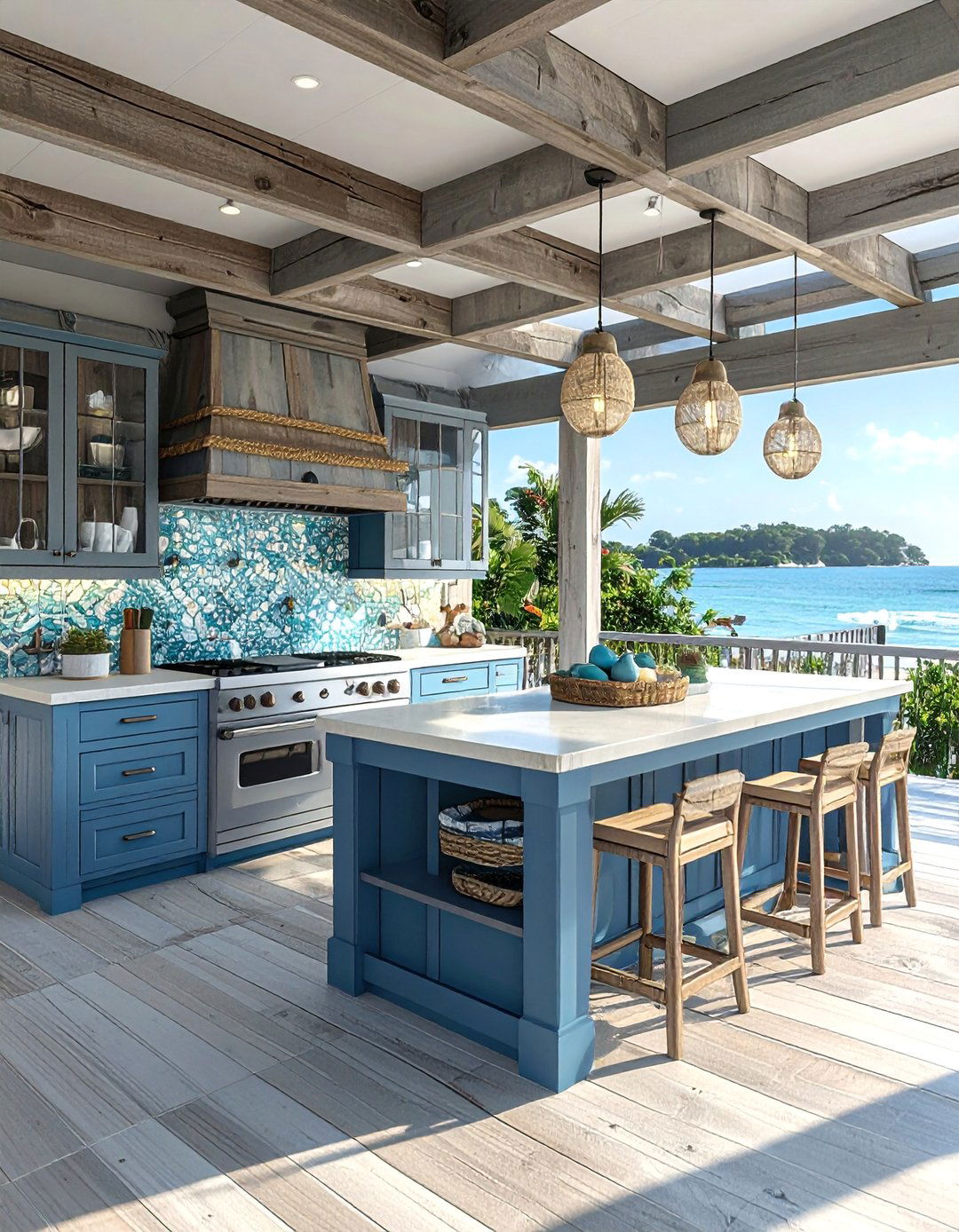
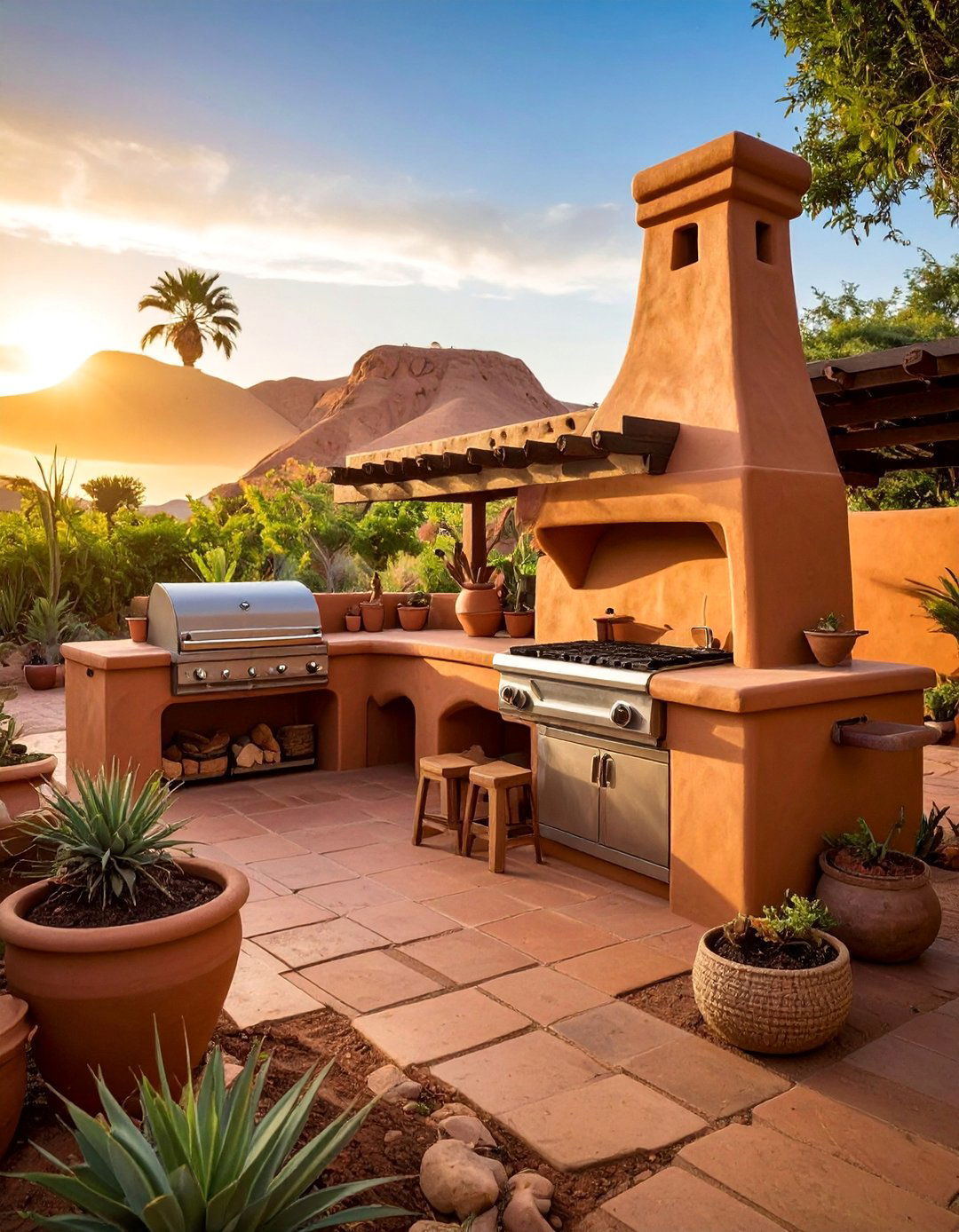
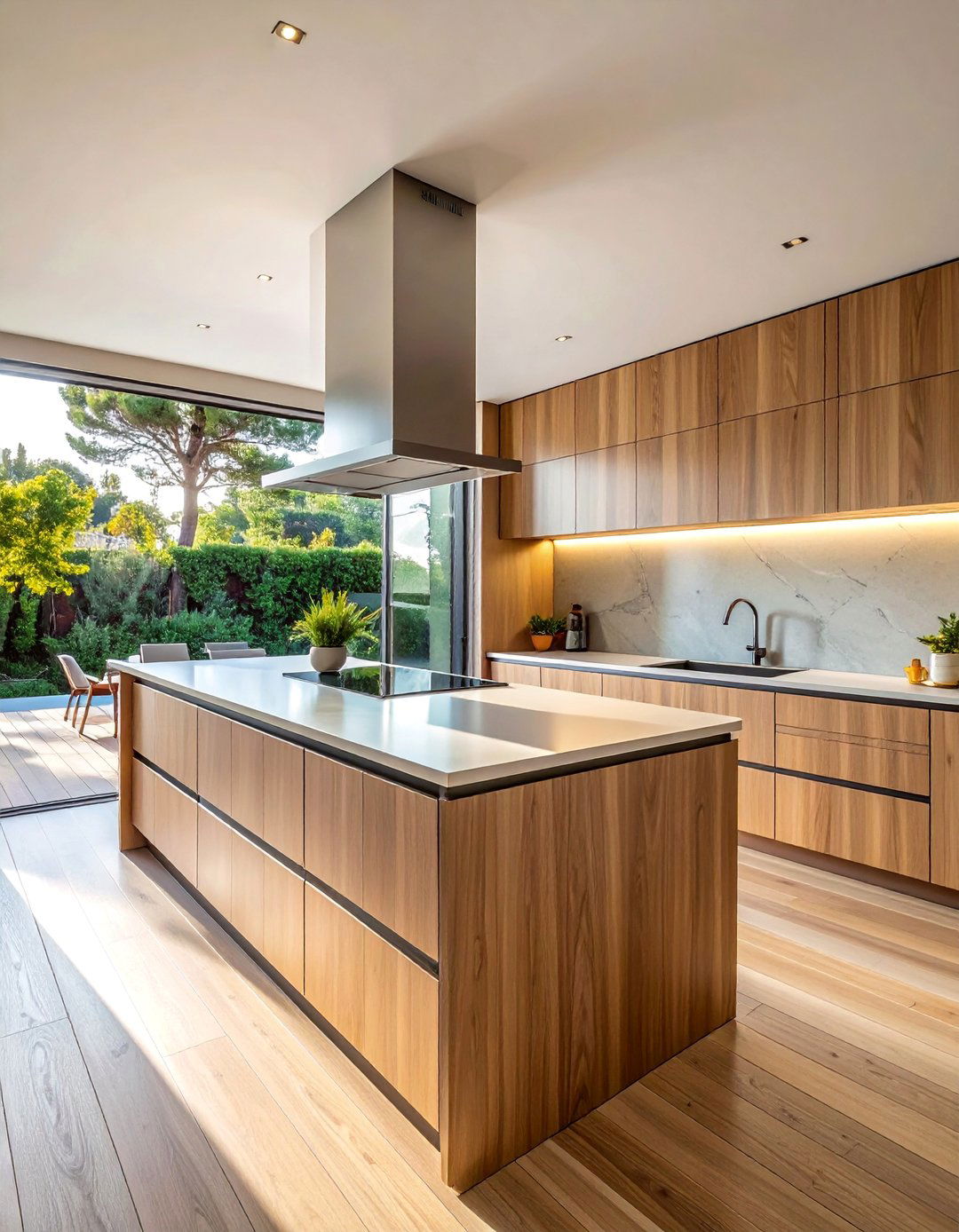
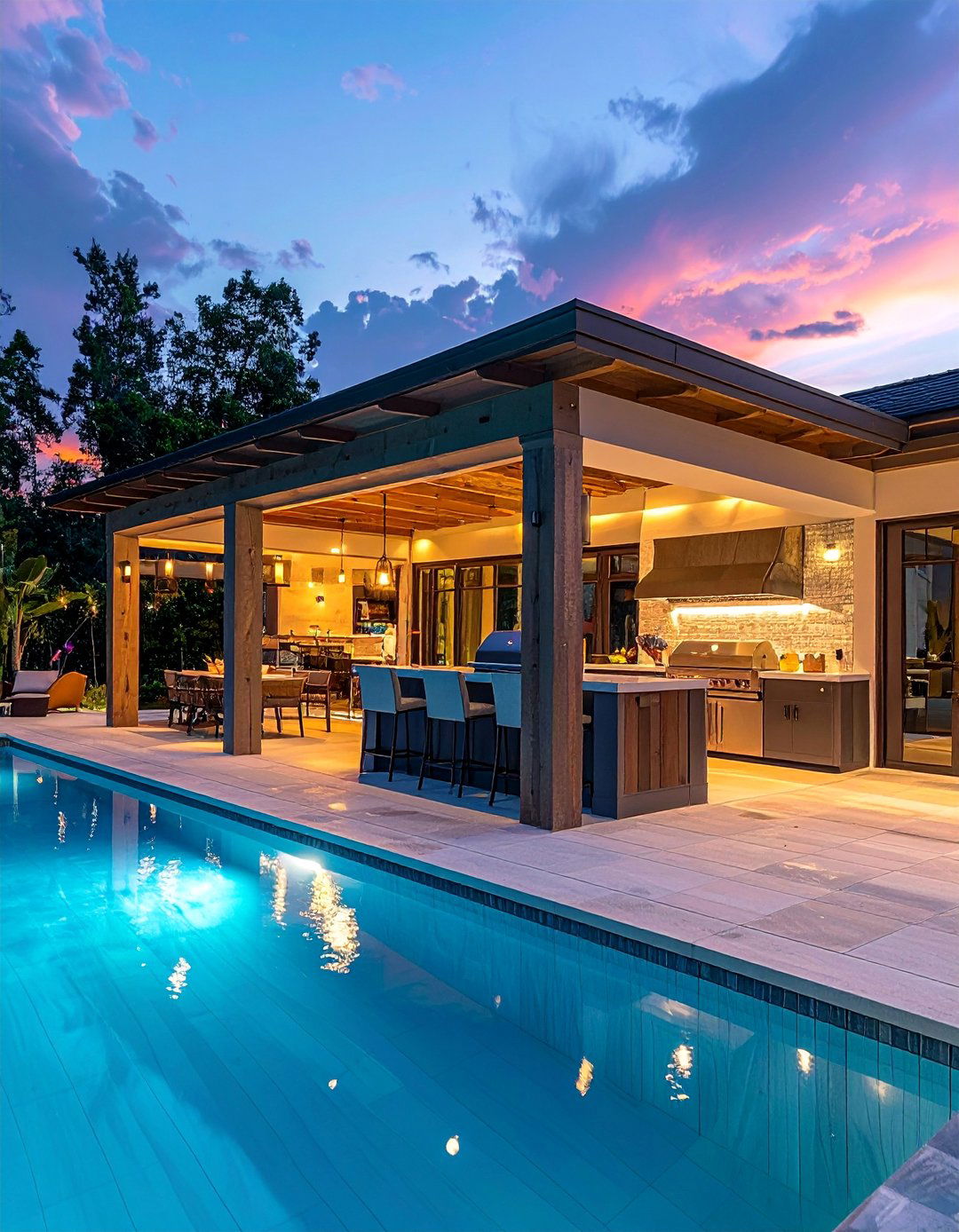
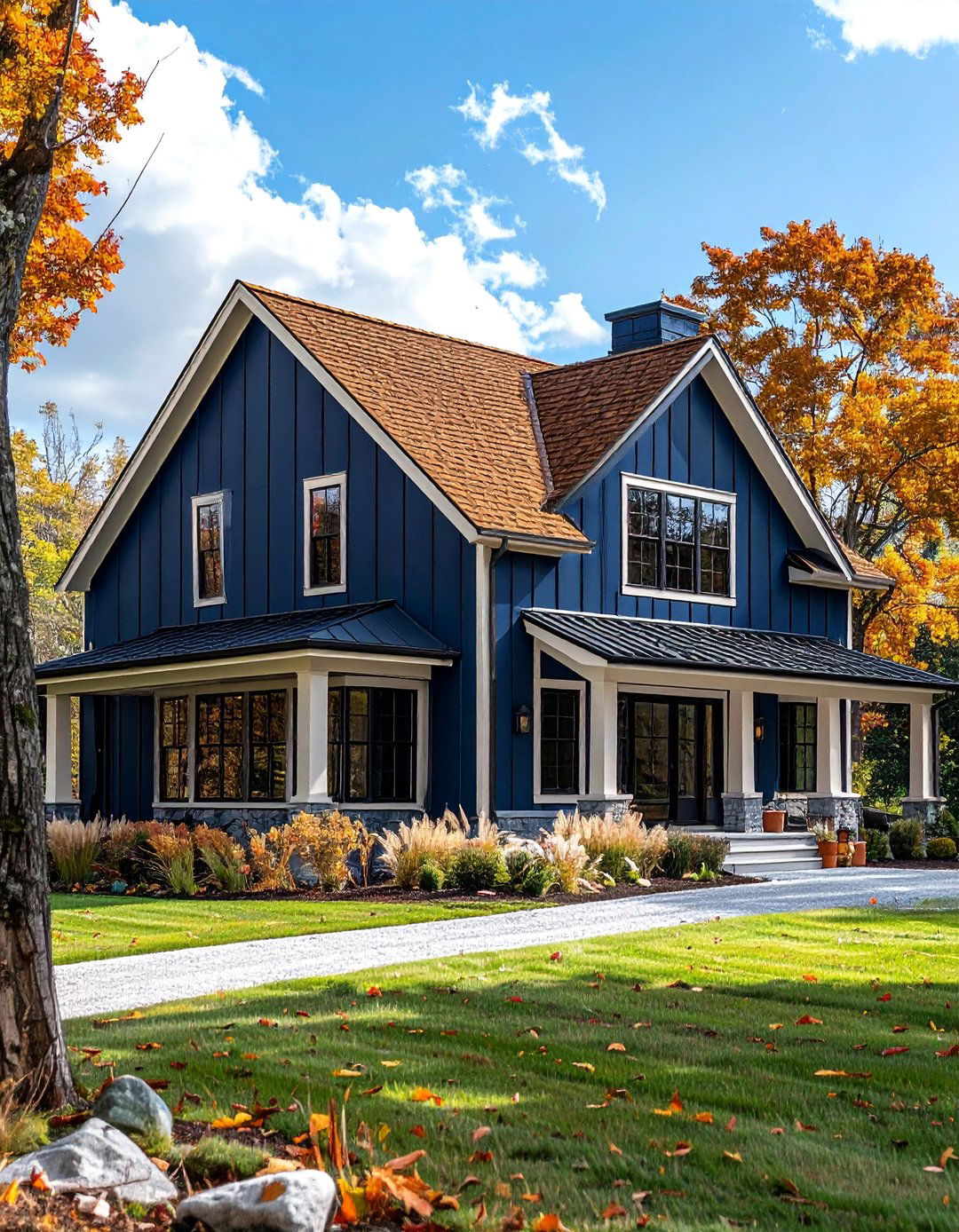
Leave a Reply